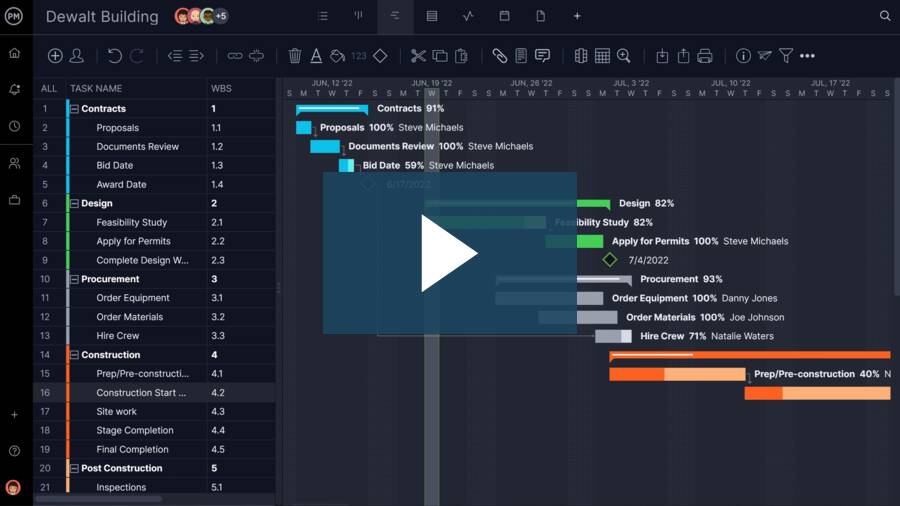Construction projects can be big, complex and often unruly, with regulatory issues, safety concerns, equipment rentals, multiple teams and more. If you want to keep a construction project on track and meet your deadlines, you want construction scheduling software that’s robust and dynamic.
What Is Construction Scheduling Software?
The term construction scheduling software describes digital solutions that help you make construction schedules via construction project management tools such as Gantt charts, project calendars, to-do lists and dashboards.
Construction scheduling tools should enable you to assign project tasks to your construction site crew, track their work hours and daily progress and log any events or issues.
However, there are many different alternatives, each with unique features and functionality—which is why we reviewed and ranked the best construction scheduling software out there.
What Features Make the Best Construction Scheduling Software?
Before we learn about the best construction scheduling software of 2025, let’s review the project management tools and key features any construction project management software should offer.
- Task management tools: The first step when creating a construction schedule is identifying project tasks and durations. Task management tools should allow you to assign those tasks to team members.
- Resource management tools: All construction projects involve resources like labor, raw materials and equipment, so seek features to allocate those resources and monitor their utilization and availability as projects are executed.
- Project planning & scheduling tools: Project planning tools like Gantt charts, kanban boards, punch lists and project calendars are preferred for construction scheduling and planning.
- Project tracking tools: Look for project tracking features such as real-time dashboards to track team performance and whether task due dates are being met.
- Project reporting tools: Reporting is fundamental for the successful and timely completion of construction projects. Construction scheduling software with project status reports can regularly update stakeholders.
- Cost management tools: Construction scheduling tools should also include cost-tracking features such as timesheets, dashboards and budget baselines to help you monitor your project costs.
- Mobile app: Choose a construction scheduling program with a mobile app so your crew can update project tasks and log hours from the construction site.
2025 Best Construction Scheduling Software Rankings
Many products on the market sell themselves as the go-to construction scheduling tool for the construction project manager. But how do they measure up to the task?
We’ve thoroughly reviewed different types of construction scheduling tools, including:
- Construction job scheduling software
- Construction employee scheduling software
- Construction resource scheduling software
- Contractor scheduling software
- Commercial construction scheduling software
- Residential construction scheduling software
We’ve looked at the best for you—here are our top picks.
1. ProjectManager

ProjectManager is online project management software that can be used anywhere and by anyone. Of course, this is a benefit to construction scheduling, where work occurs on-site and among multiple teams.
Beyond that, the suite of tools featured offers a means to control every aspect of the construction planning, from organizing tasks, costs and resources to linking dependent tasks and setting milestones to break the larger project schedule up into more manageable bits. That’s in addition to the larger construction project management of construction project planning, construction vendor management, construction cost management and more. Plus, unlike some other online construction scheduling software options on this list, ProjectManager offers a free 30-day trial to try it out for yourself.
Schedule With Gantt Charts
For example, ProjectManager has an online Gantt chart tool that’s a visual timeline of the project, with tasks represented by a start date and end date. The duration of the task is indicated by a line, which can be easily edited by simply dragging and dropping when and if there’s a schedule change.
Use the online Gantt chart to assign tasks to individuals on the team, identify task dependencies and track the critical path tasks of your projects. They can then collaborate at the task level, leaving comments and adding relevant documents and images directly to the task. If any of those tasks are dependent on another being completed before they can begin, the construction project manager can link them, preventing bottlenecks and leaving your crew idle.
Track Your Resources
Another aspect of construction schedule software that is complex is resource management. Construction requires many different skill sets working together throughout the many phases of the project, and ProjectManager makes it easy to coordinate moving parts with resource scheduling features that chart availability, skillset, cost and allocation of the various workforce and materials. All of this occurs in real time, so the pieces come together as you need them.
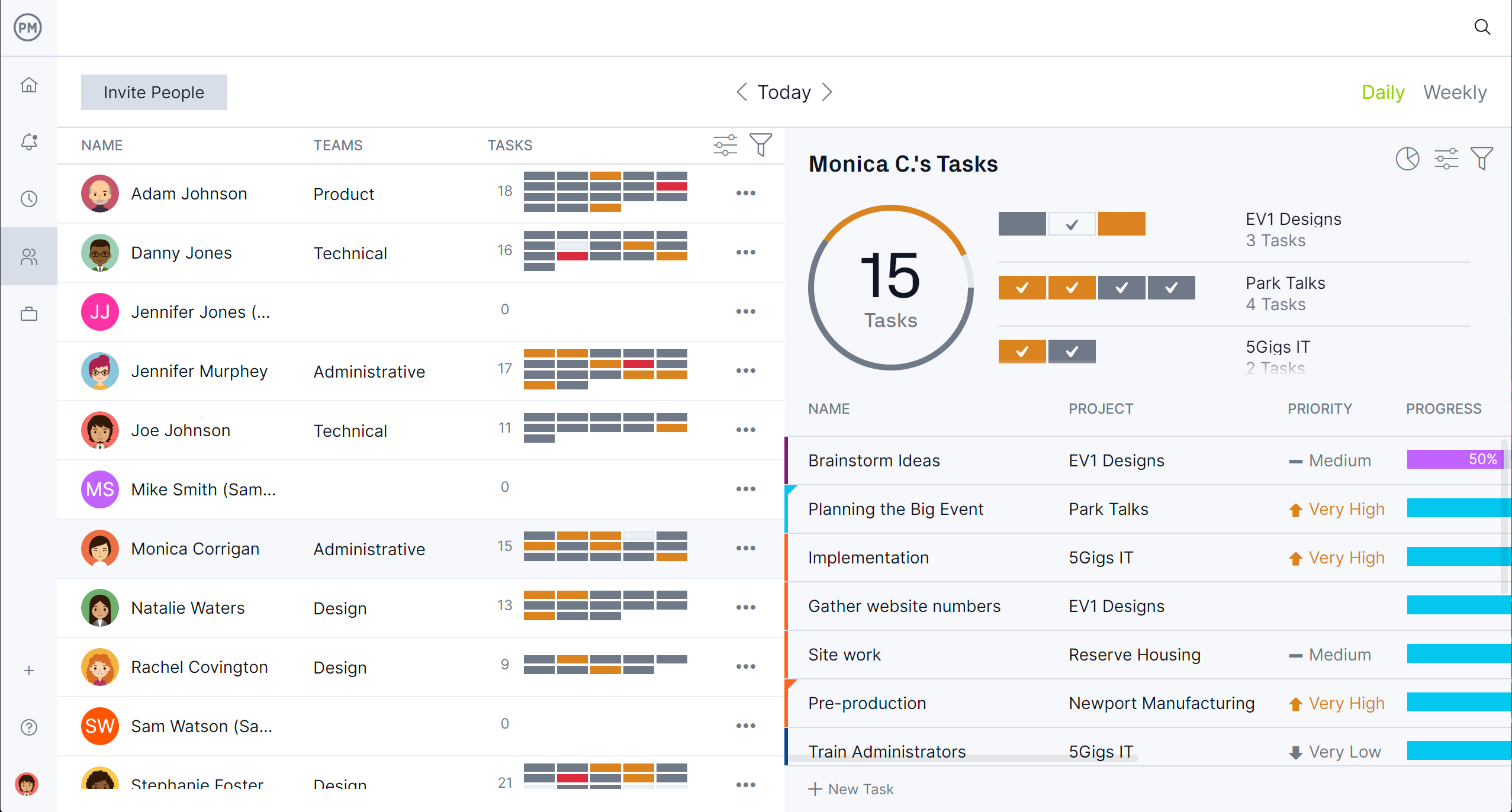
Streamline Payroll
Once you’ve scheduled the work, you can track your crew and streamline the payment process with timesheets that track the hours your team works, whether in the office or on-site. Timesheets can be updated and submitted anywhere for easy review by managers, who can approve with a keystroke. Plus, all your files are uploaded online, where they can be accessed when needed.
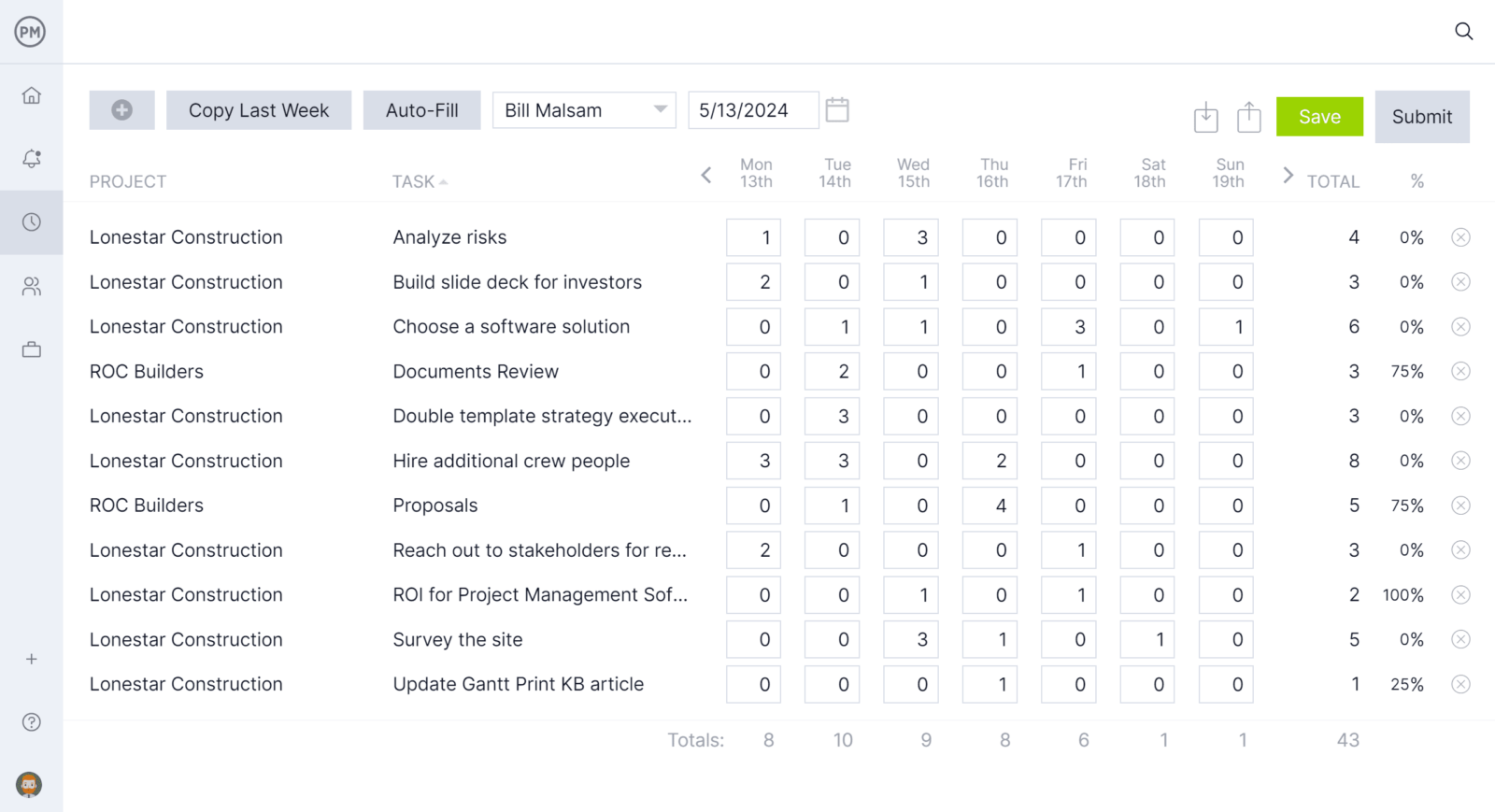
Given all these amazing features at a low price point, it’s clear that ProjectManager is the heavyweight champ of construction project management software. Click here to start a 30-day free trial!
Verdict: Best Online Construction Scheduling Software for Construction Project Management
ProjectManager Pros & Key Features
- Online Gantt charts for construction planning and scheduling
- Resource planning, scheduling and tracking tools for construction
- Mac-friendly, Cloud-based construction scheduling software with unlimited file storage
- Free trial is available
- Mobile app for Android and iOS
ProjectManager Cons & Limitations
- Limited customization features
- No payment or invoicing tools
- Lacks construction bidding functionality
- No free plan
ProjectManager Pricing
- Team: $14.00 user/month
- Business: $26.00 user/month
- Enterprise: contact sales for a custom quote
ProjectManager Reviews
- G2 review: 4.4 / 5
- Capterra review: 4.1 / 5
Highlighted User Reviews
- “ProjectManager works very well with both large and small-scale projects. Being able to use this with anything from a project involving only two members of staff, to hundreds, has been invaluable.” Peter W – from Capterra
- “We used to manage our projects, resources, and reporting in different systems. Enter ProjectManager. We have consolidated systems and work more efficiently.” Jeffrey M – from Capterra
- “Having the full scope of activities and who is responsible to do it, plus the time tracking is excellent.” Flavio M – from G2
- “It has an excellent accounting system capable of calculating the time that a person has used to develop a task that was assigned to him, I like being able to collaborate with all my colleagues in the Finance sector through ProjectManager.” Jesus C – from G2
- “The UI of the application is user-friendly, and it helps to identify what we are looking for with minimal effort.” Pavan H – from G2
2. Procore
![]()
Construction project managers use Procore for HR, safety and financial concerns related to the construction schedule. It has a place for the many documents related to construction. There’s an employee contact log, with everyone’s certification, though billing is very confusing and, even if understood, not up to the industry standard.
Related: Best Procore Alternatives: Paid & Free Options Ranked
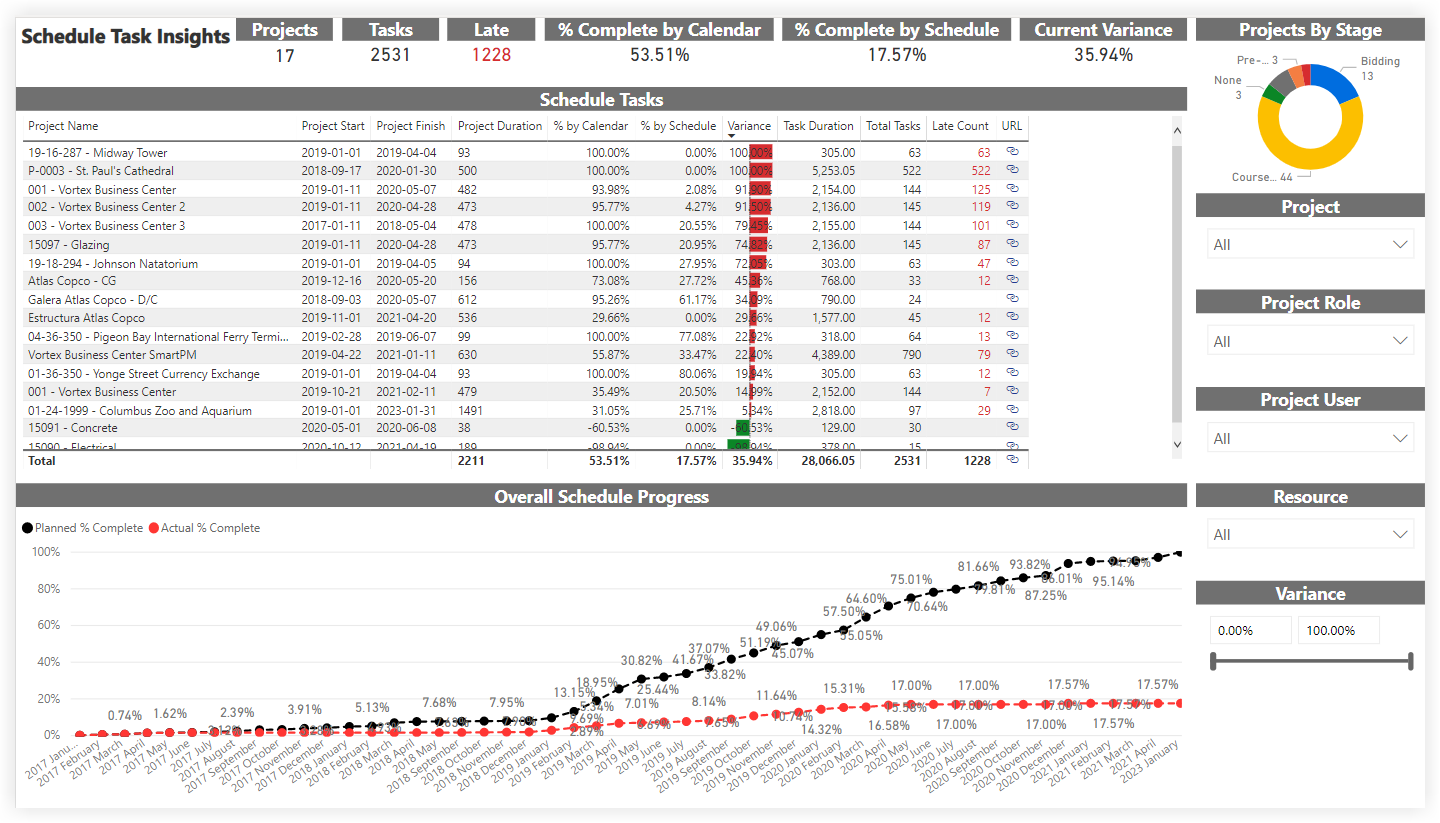
It’s a decent construction scheduling software for medium to large construction companies, but if you’re running a smaller company, the software is too bulky and likely too expensive. It’s good for end-users, in that it involves them in the planning for future projects and improvements. That said, it’s not great if you’re interfacing with architects and engineers or subcontractors. The integrations are also spotty, including financials, and the bidding module doesn’t update automatically.
We’ve also reviewed the best Procore alternatives in case you’d like to learn more about Procore and software that offers similar construction project management features.
Verdict: Best Construction Scheduling Tools for Large Projects
Procore Pros & Key Features
- Best construction scheduling software for large projects
- Document management features for construction management
- Project cost tracking and budgeting tools
- Time tracking features for managing the construction site
- Compatibility with Microsoft Project and Primavera P6
- Mobile app for Android and iOS
Procore Cons & Limitations
- Procore only offers two project scheduling views, Gantt charts and project calendars
- Complex construction scheduling tool with a steep learning curve
- Limited resource planning tools for managing resource allocation
- Gantt charts don’t track task costs
- No free trial
- No free plan
Procore Pricing
- Contact sales for a custom quote
Procore Reviews
- G2 review: 4.6 / 5
- Capterra review: 4.5 / 5
Highlighted User Reviews
- “Procore is the king of remote working especially for administrative tasks.” Andy G – from Capterra
- “User friendly and easy to navigate with little to no training.” Sienna W – from Capterra
- “I enjoy the Procore Learning Center, which helps me when I am unsure of how to start or edit a task in Procore.” Olivia E – from G2
- “We use Procore daily and it makes management of a project so much easier.” Lise B – from G2
3. BuilderTrend
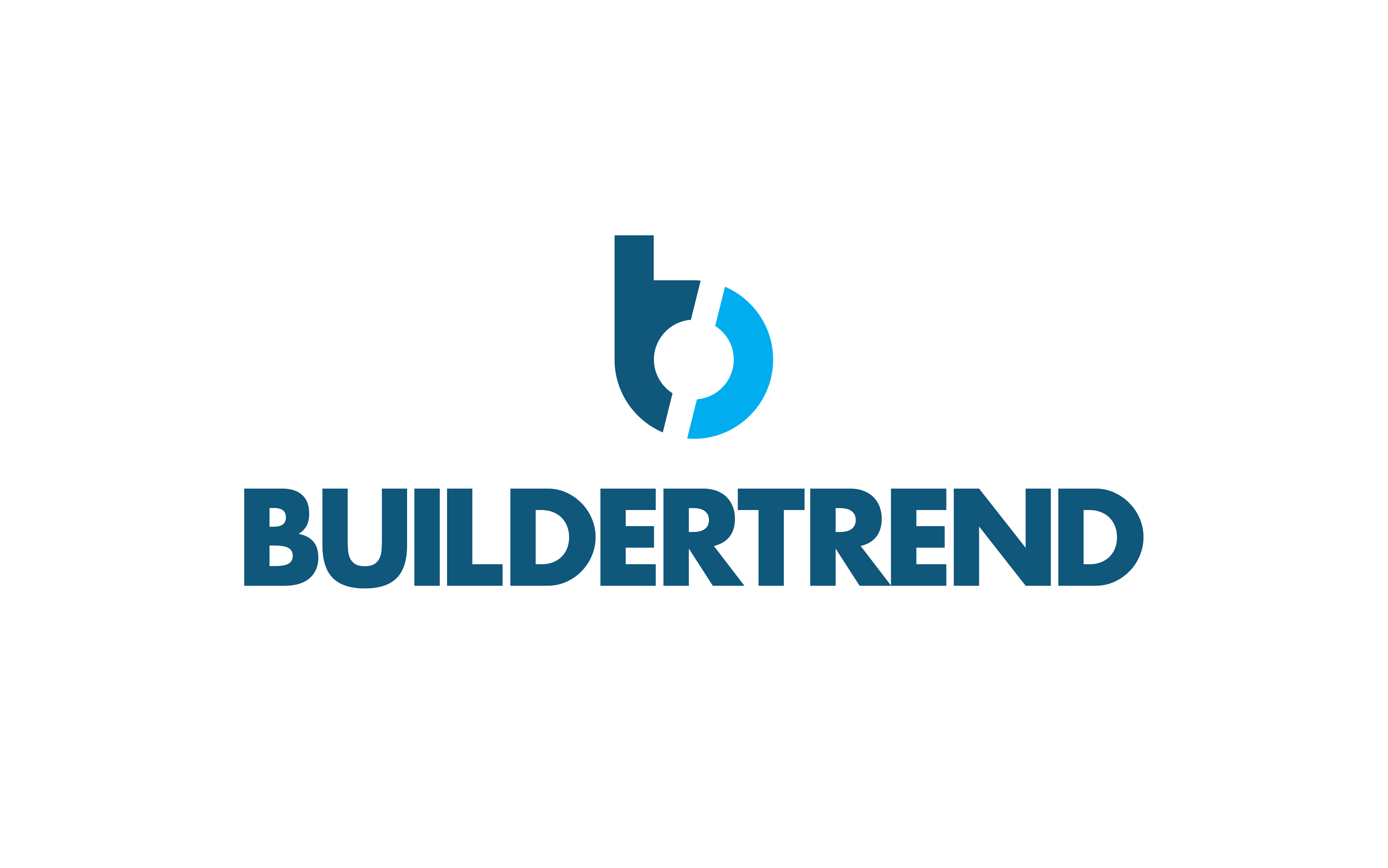
BuilderTrend is construction schedule software for construction managers and contractors. It has a Gantt chart to create construction schedules and an intuitive user interface. If you run into any trouble, they provide good customer support. It’s expensive, but you’re paying for that hand-holding, among other things.
Related: Best Buildertrend Alternatives: Free & Paid Options Ranked
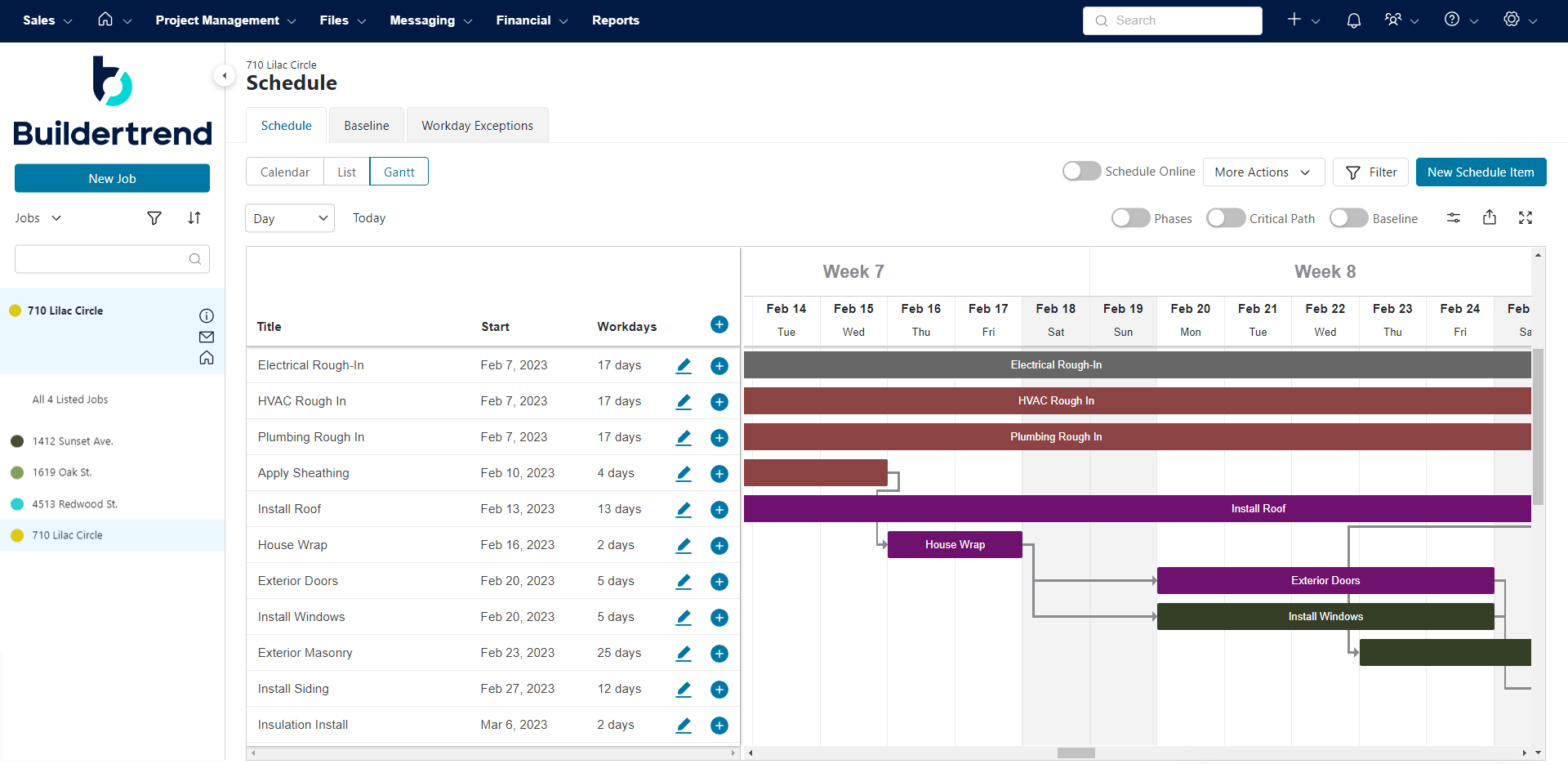
The dashboard is especially well-designed and there are strong reporting tools. Both of these features are critical to keeping to your construction project schedule. However, there’s no free version, so if you’re interested in the software, you’ll have to pay.
The estimating functionality, which is an important part of any construction scheduling software, is poor and very labor-intensive. Another frustrating aspect is that there aren’t alerts to let users know when they have a message.
Verdict: Best Residential Construction Scheduling Software for Independent Home Builders
BuilderTrend Pros & Key Features
- Intuitive interface makes it easy to use
- Good customer support helps with any questions
- Customer relationship management tools
- Basic construction project scheduling tools like Gantt charts, calendars and to-do lists
- Mobile app for Android and iOS
BuilderTrend Cons & Limitations
- Gantt charts lack resource management and cost tracking features
- Lightweight construction project management feature set and functionality
- The software monthly subscription fee is expensive
- No free plan
- No free trial
BuilderTrend Pricing
- Contact sales for a custom quote
BuilderTrend Reviews
- G2 review: 4.2 / 5
- Capterra review: 4.5 / 5
Highlighted User Reviews
- “Buildertrend has been a very helpful solution for our construction business.” Janelle B – from Capterra
- “Very easy to keep track of various different elements throughout construction.” Brandi G – from Capterra
- “I love that Buildertrend is a one stop shop for everything building related.” Paige M – from G2
- “What I love most about Buildertrend is how user-friendly it is.” Antonio C – from G2
4. CoConstruct

CoConstruct is a popular construction software with limited scheduling features. It’s web-based and used by contractors, modelers and design-build companies. It has features such as activity planning, scheduling, estimating, budgeting and communications. One of the pluses of CoConstruct is that it’s easy to customize and has good customer service if you need assistance. However, one downside for those who are window shopping is the fact that CoConstruct doesn’t offer a free trial.
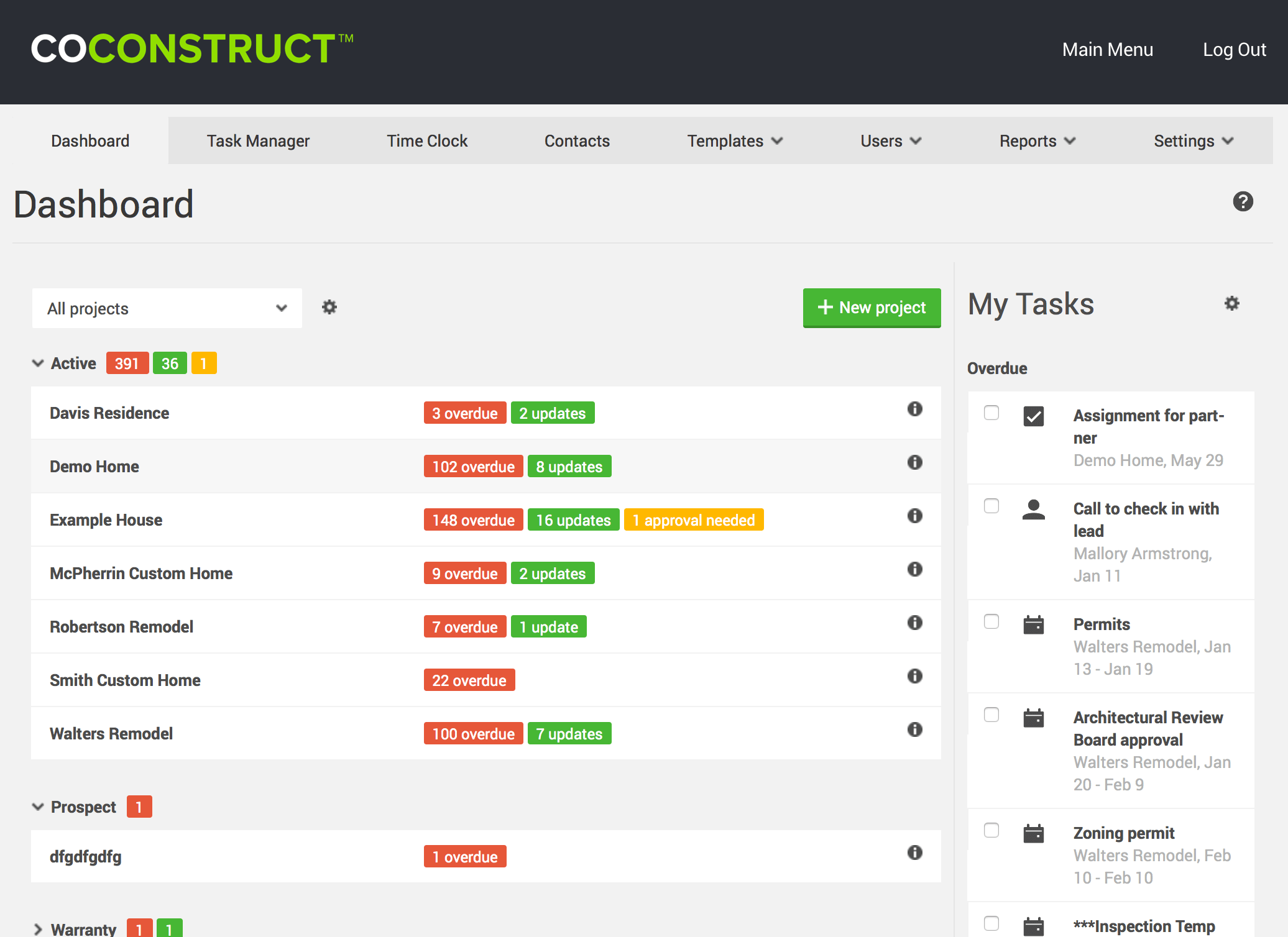
It’s also expensive and has limited integrations, which can frustrate users who are interested in a system that works with their other software packages, related to construction or not, such as accounting and social tools.
Verdict: Best Construction Scheduling Software for Residential Building
CoConstruct Pros & Key Features
- Scheduling software equipped with timesheets
- Cost estimating features for construction teams
- Easy-to-use task lists for project scheduling
- Mobile app for Android and iOS
CoConstruct Cons & Limitations
- Limited construction project scheduling tools
- Missing important resource management tools like workload charts and resource utilization dashboards
- Pretty expensive compared to some other construction scheduling software
- No free trial
- No free plan
CoConstruct Pricing
- Contact sales for a custom quote
CoConstruct Reviews
- G2 review: 4 / 5
- Capterra review: 4.7 / 5
Highlighted User Reviews
- “I’ve truly been impressed with CoConstruct’s customer service, webinar, and coaching availability.” Sam G – from Capterra
- “I like that, once all of your templates, specs, and trade partners are populated, it is very easy to build professional looking proposals.” Becky S – from Capterra
- “Estimating and job tracking features all in one place.” Brandee V – from G2
- “The clients can see precisely what we intend to build and the materials we will utilize.” Jorge P – from G2
5. Workyard
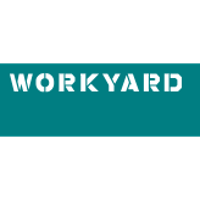
Workyard is built from the ground up to support the needs of fast-moving construction and field service businesses. Workyard’s contractor scheduling software is part of a workforce-management system that includes time-tracking, task tracking, labor compliance, and other tools.
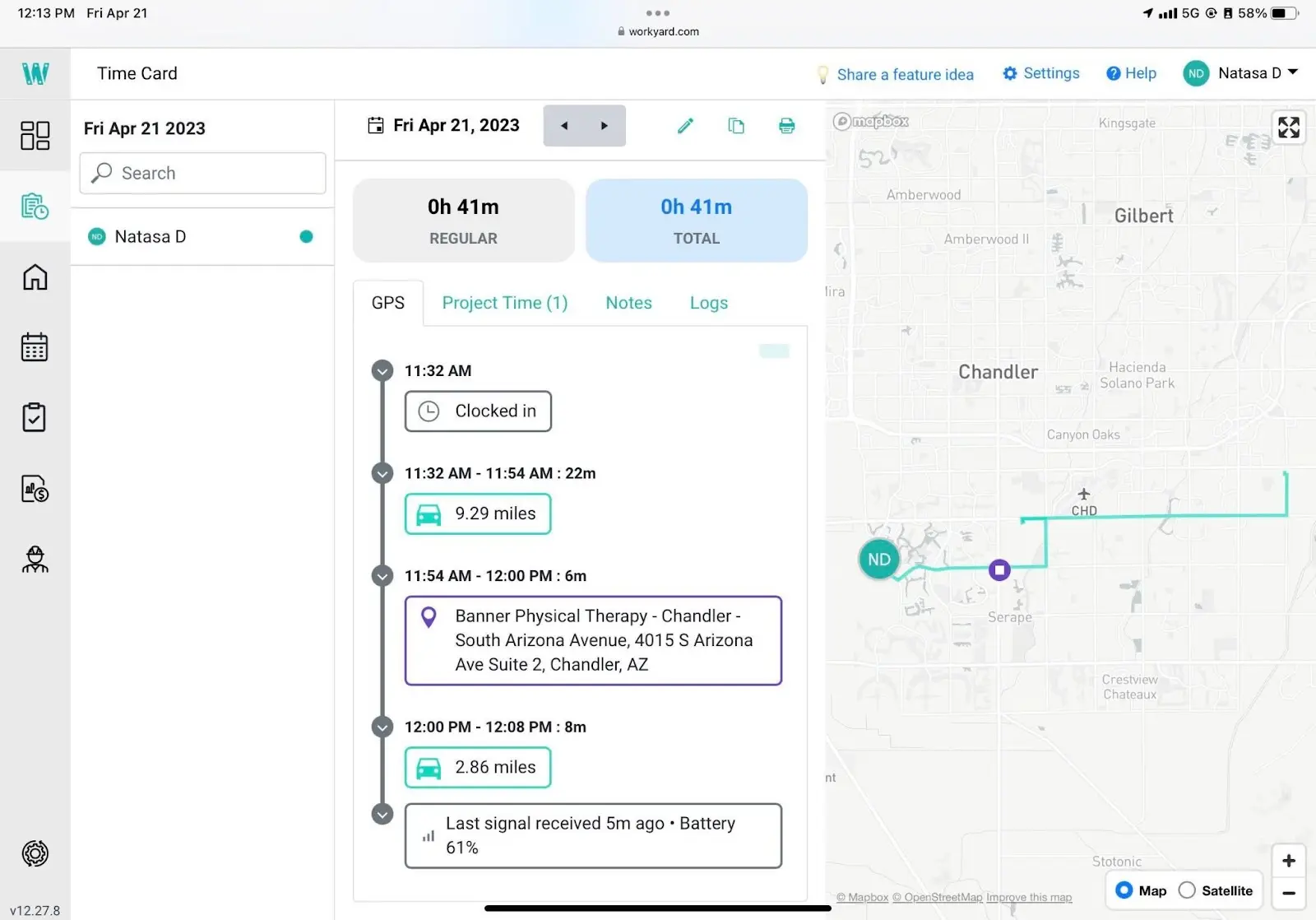
Widely praised for its ease of use and accuracy, Workyard’s GPS tracking system is precise enough to automatically clock workers in when they enter a jobsite. Meanwhile, Workyard’s scheduling tools can duplicate tasks, create repeating assignments and provide job checklists (while collecting worker notes) to ensure everyone’s on the same page with every task. New tasks or updates automatically trigger notifications to applicable workers so no one’s confused or left behind.
There are bulk-edit scheduled entries, review and/or approve time off requests and review a real-time map view of all active worker locations to always send the most suitable tech to any job. However, Workyard might not be the choice for small-to-medium sized construction firms for monitoring and managing their workforce. Pricing, especially if using multiple apps, can get expensive. Other issues include not being able to view all workers at one time and users have complained about difficulty changing time entries for employees who forgot to log in.
Verdict: Best Construction Scheduling Software for Workforce Management Features
Workyard Foreman Pros & Key Features
- Intuitive drag-and-drop interface for calendar management
- Easily assign crew members to projects and locations
- Instantly push schedule updates to mobile devices to your team
- Accurate GPS-based time tracking
- Automatic overtime alerts and reminders for mandatory breaks
- Quick communication between office staff and field personnel
Workyard Cons & Limitations
- No optional SMS alerts for scheduled tasks
- No native CRM integrations
- Privacy-conscious workers may not like location tracking
- No free plan
Workyard Pricing
- Starter: $6.00 user/month (plus $50.00 company base fee)
- Pro: $13.00 user/month (plus $50.00 company base fee)
- Enterprise: contact sales for a custom quote
Workyard Reviews
- G2 review: 2.5 / 5
- Capterra review: 4.8 / 5
Highlighted User Reviews
- “My experience has been fine although I wish it was a bit more hands off.” Patrick D – from Capterra
- “We have loved getting onto digital timecards, and have found the direct export from Workyard to our payroll company to greatly reduce payroll errors and delays.” Sam D – from Capterra
- “GPS tracking, Geotag and Timesheet, Very basic and easy to use.” Isaac K – from G2
- “Helpful… very helpful and user-friendly” Ankita B – from G2
6. Contractor Foreman

Contractor Foreman is construction scheduling software for construction contractors. It facilitates tasks such as managing bids, estimates, sub-contracts, work orders and more. In terms of construction scheduling, it offers Gantt charts, kanban boards and task management tools like to-do lists, punch lists and daily logs. It’s a good alternative for managing administrative tasks and construction management documents such as invoices, bills and permits.
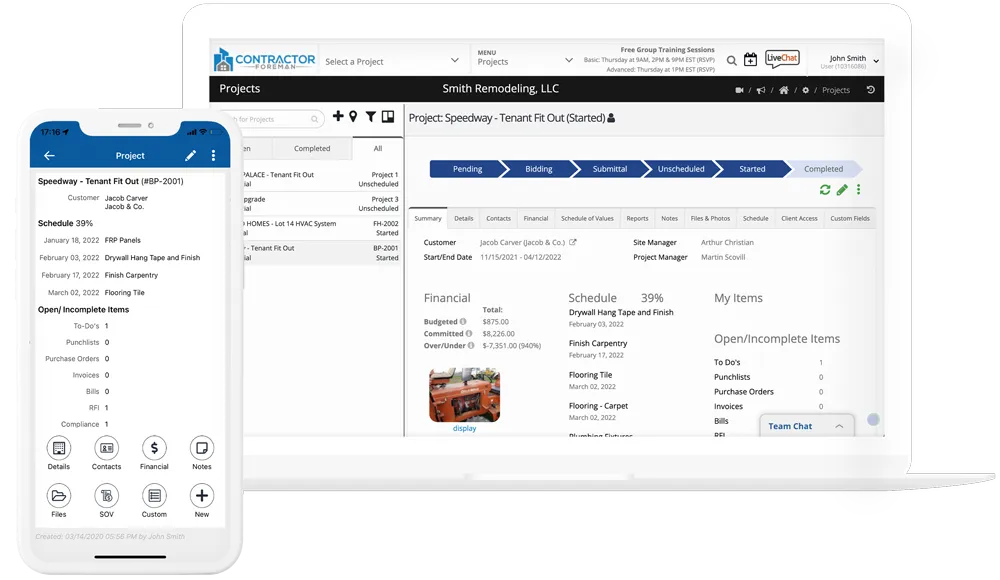
However, while Construction Foreman can be used as a construction scheduling software due to its task management tools, it doesn’t offer a robust set of project management tools. For example, it lacks resource planning tools like workload charts or project dashboards, which are essential for creating a realistic construction schedule. Another drawback of this software is its outdated user interface and lightweight features.
Verdict: Best Construction Employee Scheduling Software
Contractor Foreman Pros & Key Features
- Unlimited user monthly license fee
- Various task management tools like kanban boards, task lists and daily logs
- Simple, easy-to-use project tracking tools are ideal for monitoring daily project progress
- Daily logs, job costing and work order tracking
- Free trial
Contractor Foreman Cons & Limitations
- Overly simplistic user interface results in a poor user experience
- Lightweight construction project management tools
- Limited resource planning, scheduling and monitoring features
- No free plan
Contractor Foreman Pricing
- Basic: $49.00 user/month
- Standard: $79.00 per month, per 3 users
- Plus: $125.00 per month, per 8 users
- Pro: $166.00 per month, per 15 users
- Unlimited: $249.00 per month, unlimited users
Contractor Foreman Reviews
- G2 review: 4.5 / 5
- Capterra review: 4.5 / 5
Highlighted User Reviews
- “I like the interface, the ability to customize and integrate” Jessi J – from Capterra
- “My experience has been very positive. I appreciate the live chat function that is available during business hours.” Rafael V – from Capterra
- “It has made it possible to organize all processes efficiently, and the information is always up-to-date and verified.” Loyda V – from G2
- “I enjoy that it can house everything I need for my projects and has a client portal.” Kristin B – from G2
7. e-Builder

The good thing about e-Builder is that it’s made with scheduling government projects in mind. It helps with updating submittals, communications and invoicing. It, however, is a bit of an uphill battle to learn how to use it. Once you clear the training hurdle, it organizes documents easily and has notifications, which help with updates and changes throughout the project. The layout can be confusing; it’s cluttered and overwhelming but does offer a lot of specifics related to managing government-issued projects.
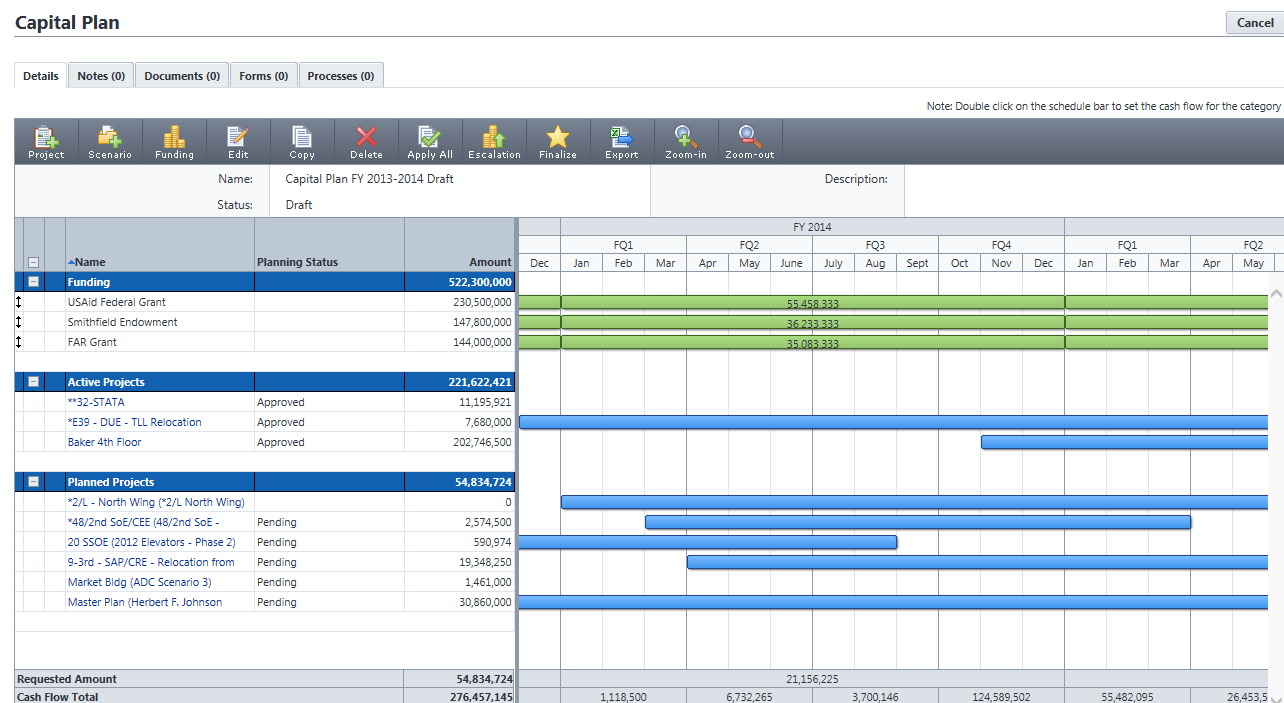
It has a nice scheduling feature, which helps manage large organizations with many employees, but the usability isn’t ideal or intuitive compared to most construction scheduling programs. It also doesn’t autosave, which can be problematic.
Verdict: Best Construction Scheduling Software for Capital Improvement Projects
e-Builder Pros & Key Features
- Helps contractors and project owners create construction reports
- Equipped with document management features for construction bidding
- Mobile app for Android and iOS
e-Builder Cons & Limitations
- User interface has an outdated look and feel
- Limited Gantt chart project scheduling functionality
- Lack of resource planning tools
- No free trial
- No free plan
e-Builder Pricing
- Contact sales for a custom quote
e-Builder Reviews
- G2 review: 3.7 / 5
- Capterra review: 4.3 / 5
Highlighted User Reviews
- “Very good auditing tool that can help score performance on internal staff and outside consultants or contractors.” Guiseppe S – from Capterra
- “As a Construction manager, I have visibility over key metrics to support project management.” Bryan H – from Capterra
- “It helps keep all the projects very organized and you can run reports by numerous subjects , people or projects.” Alesa R – from G2
- “This software covers all the bases from documentation to project closeout as needed for a construction project.” Yash C – from G2
8. Smartsheet

Communication is key to good construction scheduling and executing that schedule. Smartsheet is a nice program to streamline and add efficiency to your project communications. With Smartsheet, work is managed so that construction projects can stay productive through better communication.
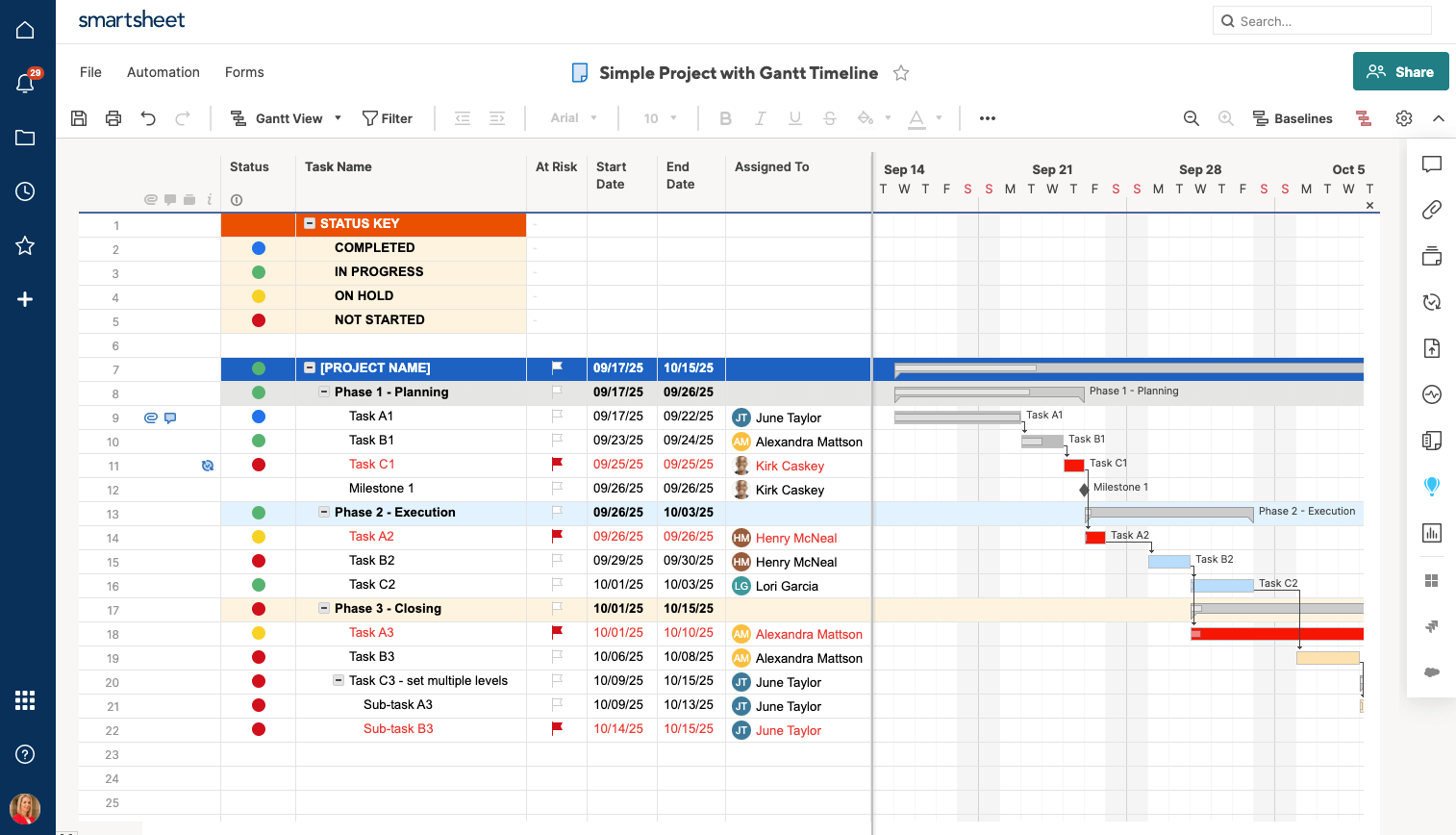
The software also manages the avalanche of paperwork involved in any project, which goes double for a construction project. With improved documentation to capture issues as they arise in a project, teams can collaborate more effectively on Smartsheet. Not only teams but vendors and clients can also be added into the loop.
All of this saves time and creates more accurate management of project resources. However, Smartsheet lacks strong Gantt functionality, which is critical for making and executing construction schedules and plans. Check our blog to learn about the best Smartsheeet alternatives of 2025.
Verdict: Best Construction Scheduling Software for Scheduling Templates
Smartsheet Pros & Key Features
- Workflow management features for construction project teams
- Resource management tools that can be used for construction projects
- Good for users transitioning from spreadsheets to scheduling software for construction
- Cost management and budgeting tools
- Free trial
- Mobile app for Android and iOS
Smartsheet Cons & Limitations
- Limited offer of scheduling features for construction projects
- Rigid, spreadsheet-based user interface that lacks the versatility of other tools
- Some aspects of the software involve a steep learning curve, which make its implementation difficult, especially for larger teams
- No free plan
Smartsheet Pricing
- Pro: $9.00 user/month, billed annually
- Business: $19.00 user/month, billed annually
- Enterprise: contact sales for a custom quote
- Advanced Work Management: contact sales for a custom quote
Smartsheet Reviews
- G2 review: 4.4/5
- Capterra review: 4.5/5
Highlighted User Reviews
- “Smartsheet is a great platform for data visualization and project management.” Pathan I – from Capterra
- “Good for tracking projects but takes some time to learn all of the features.” Marissa P – from Capterra
- “Automation can save hours of time by automatically sending emails and reminders to ensure we meet our deadlines.” Amy S – from G2
- “Easily allows a sharable document that concurrent users can view and make live changes to.” Steven K – from G2
9. Jobber
![]()
Jobber is a scheduling software that’s designed to help independent construction contractors and small construction firms run their daily operations. It offers tools for tasks such as quoting, online booking, payment processing, invoicing and job scheduling. In terms of construction scheduling, it’s equipped with to-do lists, calendars and notifications to help construction teams stay on top of their work.
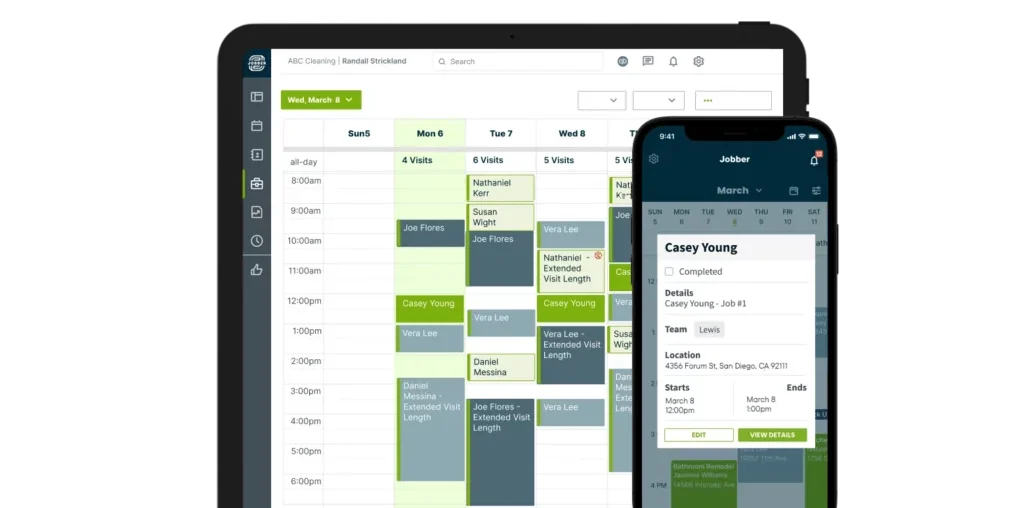
However, while Jobber is a useful tool, it’s not ideal for planning or scheduling construction projects because it lacks key features such as Gantt charts and project tracking dashboards. It also lacks tools for monitoring resource utilization and availability which play an important role in the construction scheduling process. It’s good for teams that need a solution to organize their work, rather than teams that need fully-featured construction project scheduling software.
Verdict: Best Construction Job Scheduling Software for Independent Contractors
Jobber Pros & Key Features
- Unlimited user monthly license fee
- Various task management tools like kanban boards, task lists and daily logs
- Simple, easy-to-use project tracking tools
- Daily logs, job costing and work order tracking
- Mobile app for Android and iOS
- Free trial
Jobber Cons & Limitations
- Overly simplistic user interface results in a poor user experience
- Lightweight construction project management tools
- Doesn’t have Gantt charts
- Limited resource planning, scheduling and monitoring features
- No free plan
Jobber Pricing
- Core: $29.00 user/month, billed annually
- Connect: $89.00 user/month, billed annually
- Grow: $149.00 user/month, billed annually
Jobber Reviews
- G2 review: 4.5 / 5
- Capterra review: 4.5 / 5
Highlighted User Reviews
- “I like it better than other CRMs because I do everything on my phone really.” Nick G – from Capterra
- “It is fine for doing exactly what the designers of the software want it to do. It’s simple to use.” Heather K – from Capterra
- “I use Jobber everyday, to keep my scheduled route the most efficient and to know where my crew will be.” Kristi S – from G2
- “It helps me keep track of client requests, send out quotes that get approved quickly, and invoice clients easily.” Eliseo M – from G2
10. B2W Software
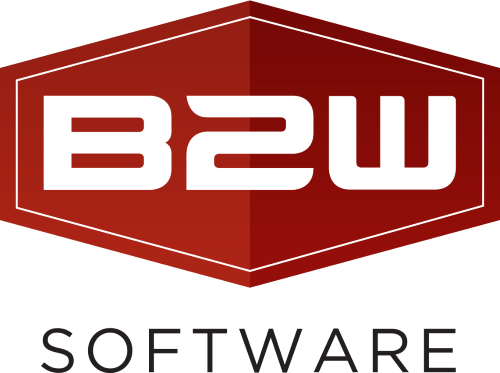
B2W Software is an estimating software for civil construction and bidding. It helps contractors bid faster, more accurately and within their business strategy. Therefore, it’s helpful for construction scheduling in that it helps create accurate estimates for cost, labor, tasks, materials and equipment.
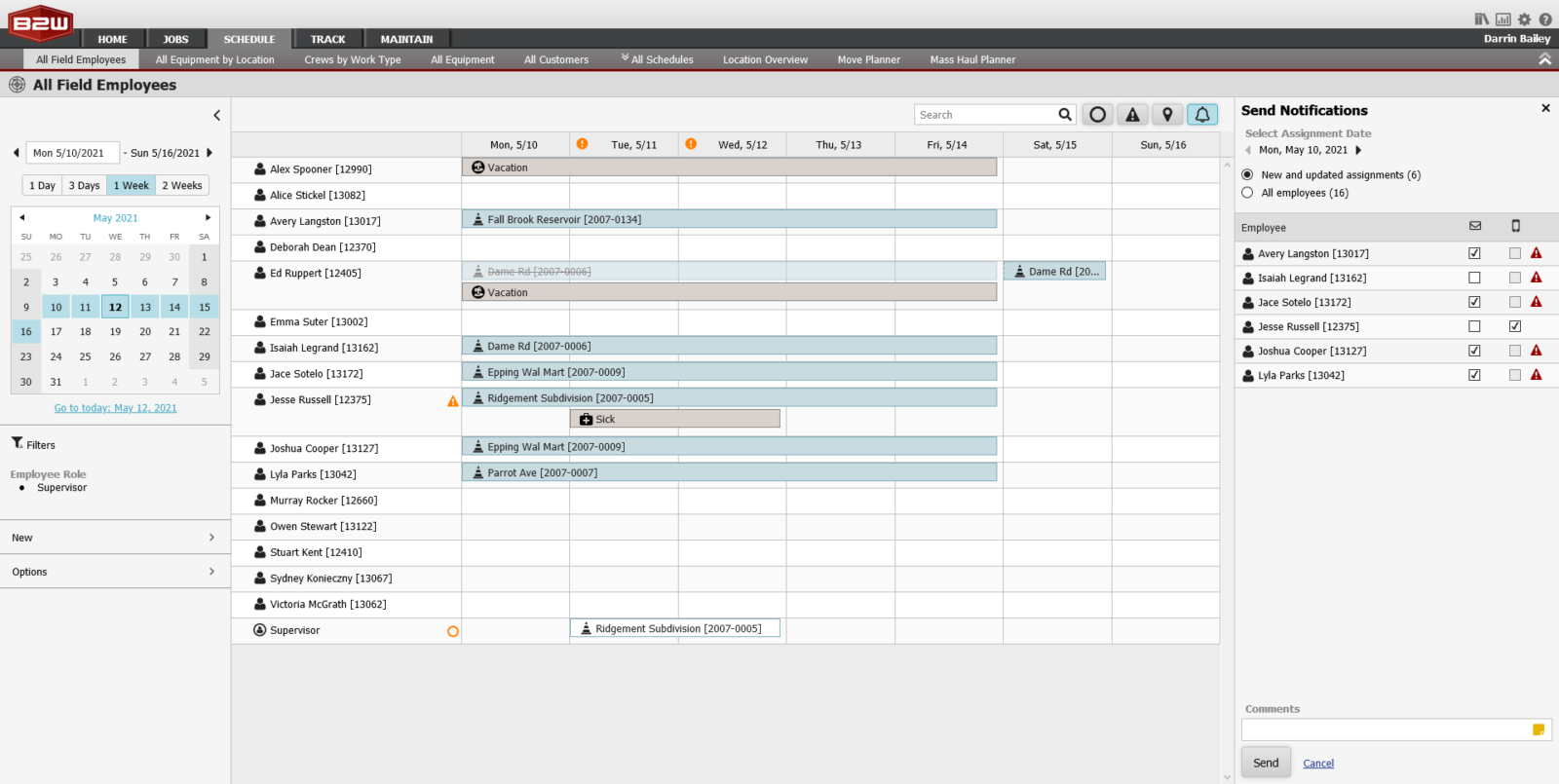
It has a central resource database and a work breakdown structure (WBS) and can be used simultaneously by multiple estimators. An issue, though, is that if a user mistakenly changes a production rate or cost, you can’t undo that change.
There are also costly maintenance fees each year and the cost, which is only provided upon request, can get expensive. And to add more users only jacks up that price further.
Verdict: Best Construction Resource Scheduling Software
B2W Pros & Key Features
- Ideal cost-estimating features for construction management
- Work logs for tracking employee hours and equipment utilization
- Simple resource planning and reporting tools
- Mobile app for Android and iOS
B2W Cons & Limitations
- Limited construction project planning, reporting and tracking tools
- Doesn’t offer Gantt charts unlike most construction project scheduling software
- Narrow feature set, focuses on basic resource planning
- No free trial
- No free plan
B2W Pricing
- Contact sales for a custom quote
B2W Reviews
- G2 review: 4.5 / 5
- Capterra review: 4.5 / 5
Highlighted User Reviews
- “I like that the software is very user-friendly and pretty straightforward.” Diana G – from Capterra
- “Overall it’s a legacy software that new competitors will likely overtake unless Trimble (who just purchased B2W) brings it into modern times with competitive pricing.” Shane A – from Capterra
- “I was using this software to bid on projects & estimate the labor hours as well as calculate the quantities.” Vinesh S – from G2
- “B2W is great, and has saved us time and allowed us to bid more projects, thus making more money each year.” Joe P – from Capterra
11. eSUB

eSUB is construction scheduling software that is made for subcontractors. It has features that allow them to create field notes, make daily reports, create and approve requests for information (RFIs) and schedule equipment.
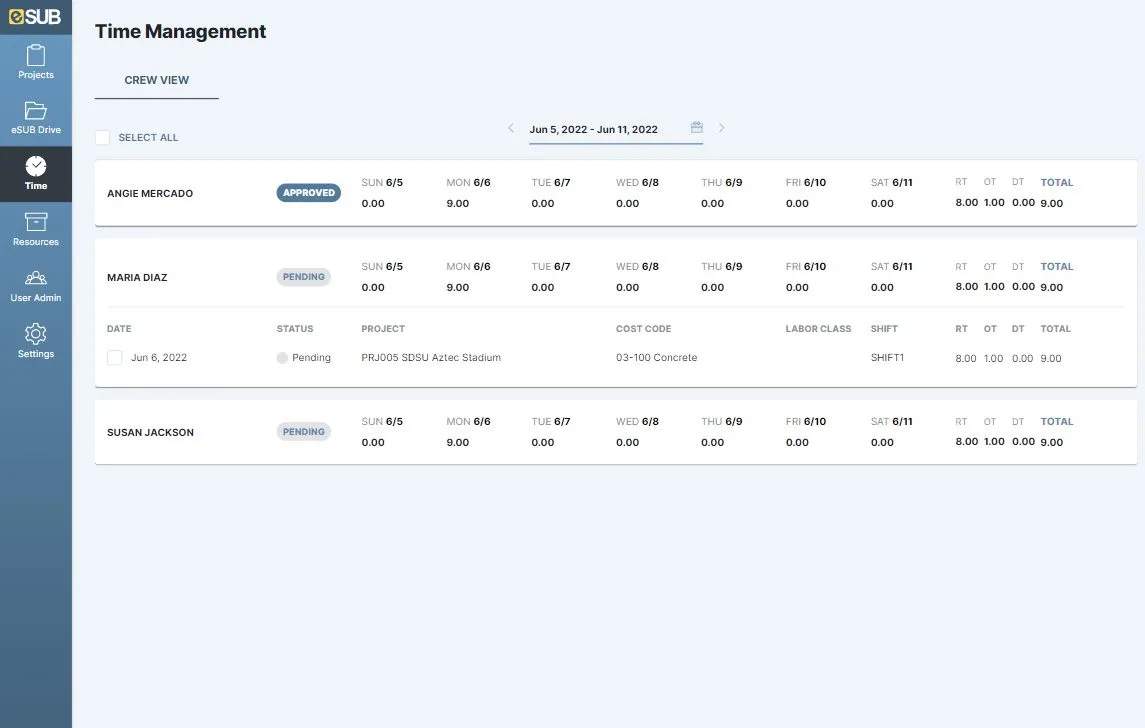
In terms of scheduling, there are calendars that capture contractors’ schedules and track the project. This software works best for small to mid-sized subcontractors, such as electrical, mechanical and other specialty trades. However, users better not make any errors in the submission because if they do they can’t be erased.
While it’s good for much of a subcontractor’s job, it’s not ideal for planning or scheduling projects due to its lack of project management tools. It’s also not built for service work or any short-term project that is only a week or two in duration.
Verdict: Best Construction Scheduling Software for Subcontractors
eSUB Pros & Key Features
- Helps subcontractors make field notes
- Single platform for document management
- Free trial
- Mobile app for Android and iOS
eSUB Cons & Limitations
- No real project scheduling tools other than task lists to assign due dates, missing tools like Gantt charts or project calendars
- Limited project management feature set, focuses on construction document management
- No dashboards for a high level project tracking and reporting view
eSUB Pricing
- Contact sales for a custom quote
eSUB Reviews
- G2 review: 4.1 / 5
- Capterra review: 4.4 / 5
Highlighted User Reviews
- “I like eSUB for keeping track of time and progress on the job.” Patrick D – from Capterra
- “Very positive. The support team is excellent. I have only had a few issues, but they have been addressed swiftly every time.” Ron M – from Capterra
- “One platform for daily reports, field notes, RFI’s, Submittals, PO’s, CO’s & reports for tracking productivity is why we have been impressed with this software.” Tom H – from G2
- “There are multiple tabs where I can visit different areas of the project to keep track of progress and how the daily activities are going.” Robert B – from G2
12. AutoDesk Build

AutoDesk Build is a great tool for connecting your office staff with workers in the field. It connects workflows and helps teams securely collaborate. It’s made up of many different products, a fact that’s good and bad. It’s nice to have many tools, but each comes with its own pricing structure which can get expensive.
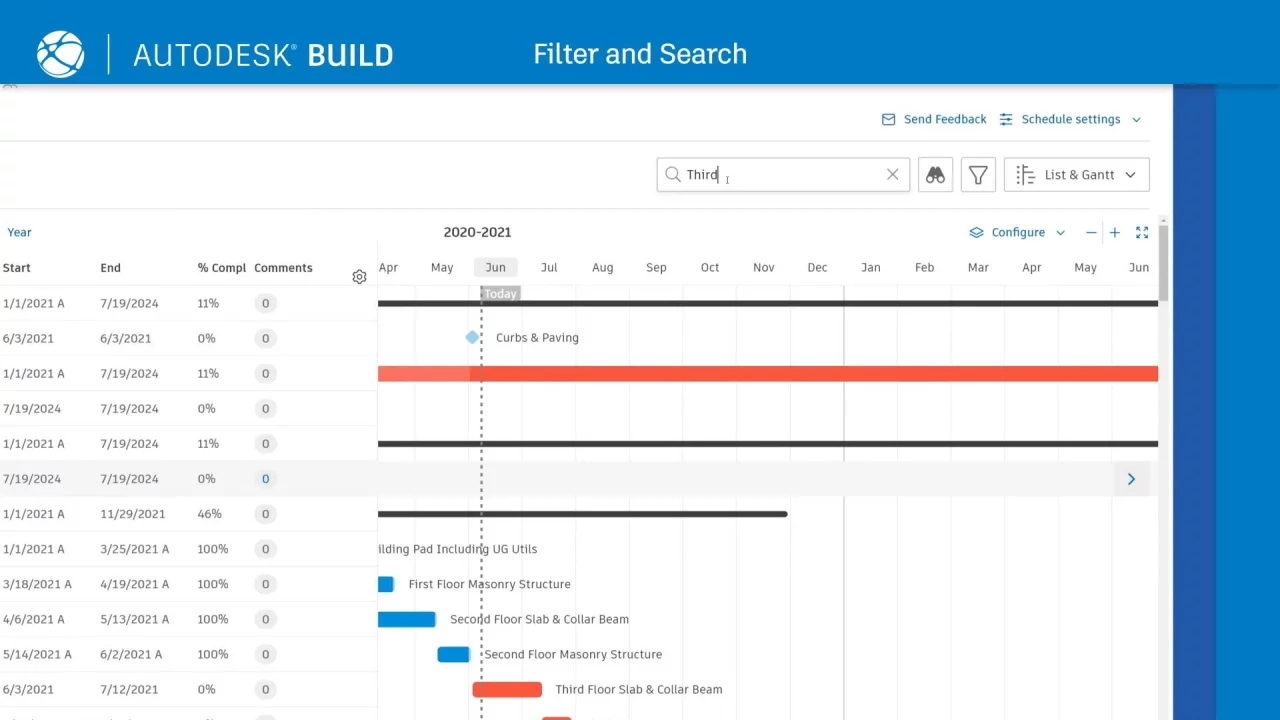
It’s a great product for transferring files and keeping your team informed. But some of its products, such as the BIM 360 Document Management are confusing and customer service is hard to reach and often not helpful.
This is more of a construction management software than a construction scheduling software, however, it does help get everyone on the same page with the construction project schedule and communicate any changes to that schedule, which is a critical part of staying on track.
Verdict: Best Construction Scheduling Software for Workflow Management
Autodesk Build Pros & Key Features
- Connects office and field teams with meeting planning features
- Part of a software platform that includes other construction management products for sale
- Gantt charts allow users to enter detailed task management information
- Free trial
- Mobile app for Android and iOS
Autodesk Build Cons & Limitations
- Autodesk Build is sold separately from other construction software that’s needed for construction project management
- Lacks resource management tools like workload or resource allocation charts
- The software is sold at a flat price for unlimited users but it’s expensive
- Users need to buy multiple products for a fully featured construction project scheduling software
- No free plan
Autodesk Build Pricing
- Autodesk build: $1,680 per year ($140 per month), billed annually
Autodesk Reviews
- G2 review: 4.4 / 5
- Capterra review: 4.3 / 5
Highlighted User Reviews
- “Great. The app is extremely intuitive so the learning curve is reduced and simple. Just looks more complicated than it really is.” Mathew H – from Capterra
- “Overall it was okay. The implementation team (3rd party vendor who sold the bundle to us) could have been better, but the product itself was overall good.” David S – from Capterra
- “I find the submittals section very helpful and intuitive when sending in shop drawings.” Carl T – from G2
- “ACC has been phenomenal for working remotely. It’s also been great for sharing content with external partners.” Jeff B – from G2
13. Buildxact
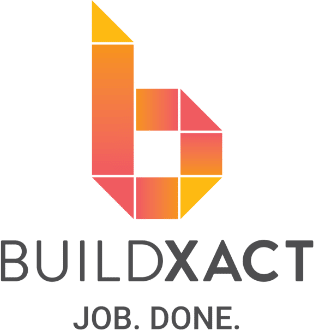
Buildxact is construction scheduling software equipped with Gantt charts that helps run projects with flexible scheduling and keeps them on budget with cash flow and profit tracking. It also helps to estimate jobs and order materials, which is key data for creating construction schedules.
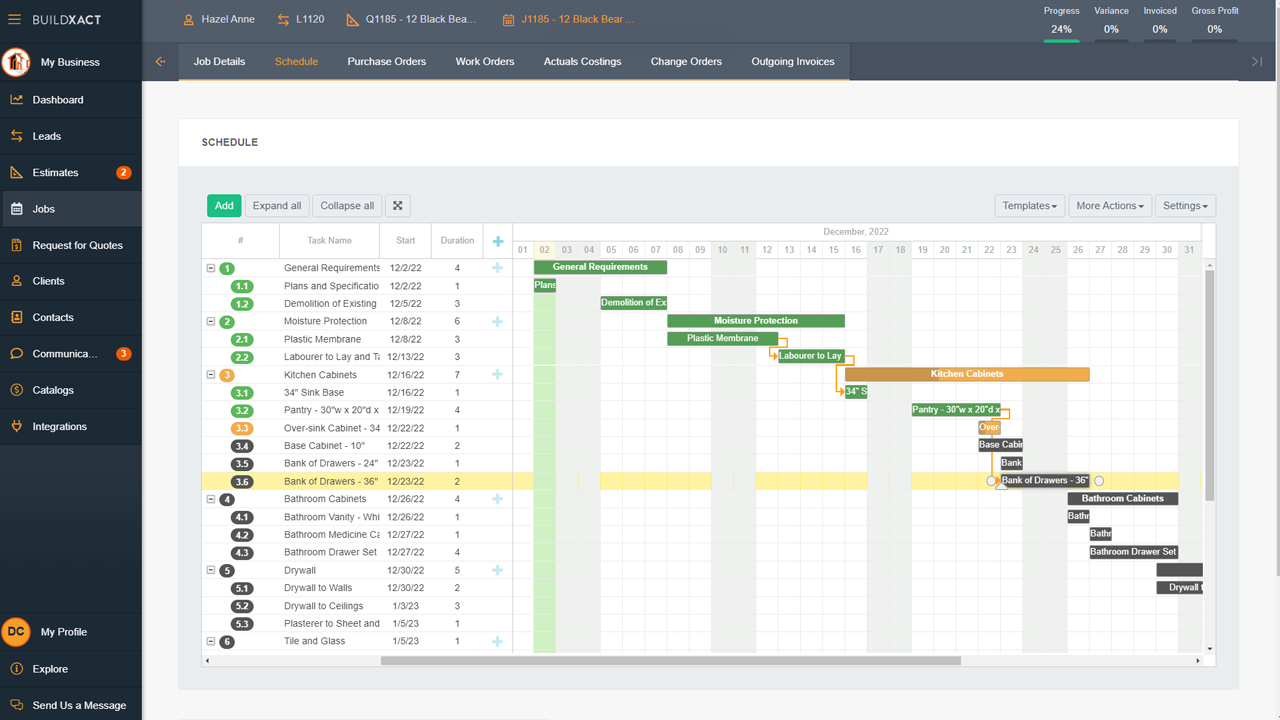
Another plus is that the company is open to suggestions for improvements from its customers, which is a great way to retain a happy consumer base. The trouble with that is there’s a lot of room for improvement.
Customers have complained about the software’s inability to adjust purchase orders after they’ve been created. The customizing of quotes is unnecessarily complex as are some of the other features, such as advanced editing. Also, the pay structure can get expensive fast if you want more features and users.
Verdict: Best Construction Scheduling Software for Small Builders
Buildxact Pros & Key Features
- Tracks cash flow and profit
- Estimates jobs and order materials
- Pre-built construction scheduling templates
- Digital material takeoff features
- Mobile app for Android and iOS
- Free trial
Buildxact Cons & Limitations
- Expensive compared to other scheduling software for construction in this list
- No task or workflow management, missing basic tools like task lists or daily logs
- Limited project monitoring and reporting features
- No free plan
Buildxact Pricing
- Entry: $199.00/month, unlimited users
- Pro: $399.00/month, unlimited users
- Teams: $599.00/month, unlimited users
Buildxact Reviews
- G2 review: 4.4 / 5
- Capterra review: 4.6 / 5
Highlighted User Reviews
- “Buidxact has sped up our estimating and the templates we’ve created have made us a lot more efficient.” Shane W – from Capterra
- “I quite like the program but the reporting is very lacking so we rely heavily on XERO to do this part.” Emma L – from Capterra
- “Quoting and take offs are easy, even changing a quote when a client decides to add or change an item.” John K – from G2
- “Buildxact is easy to use and set up.” Andrew W – from Capterra
14. InEight
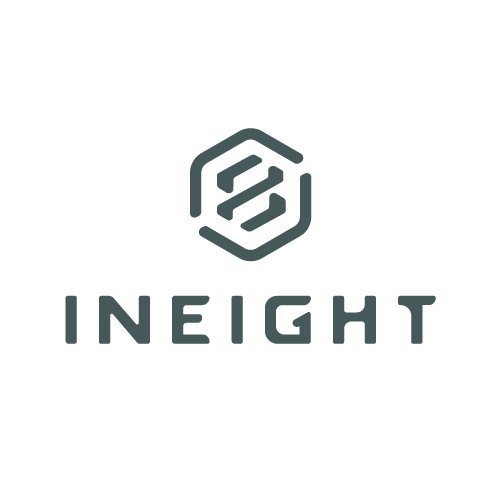
InEight is a construction management software for project owners, contractors and construction project managers who need a high-level view of the key construction project phases. You can use Gantt charts and task lists to create a project schedule along with work planning, cost estimating, budgeting and change management features for managing the key areas of your project.
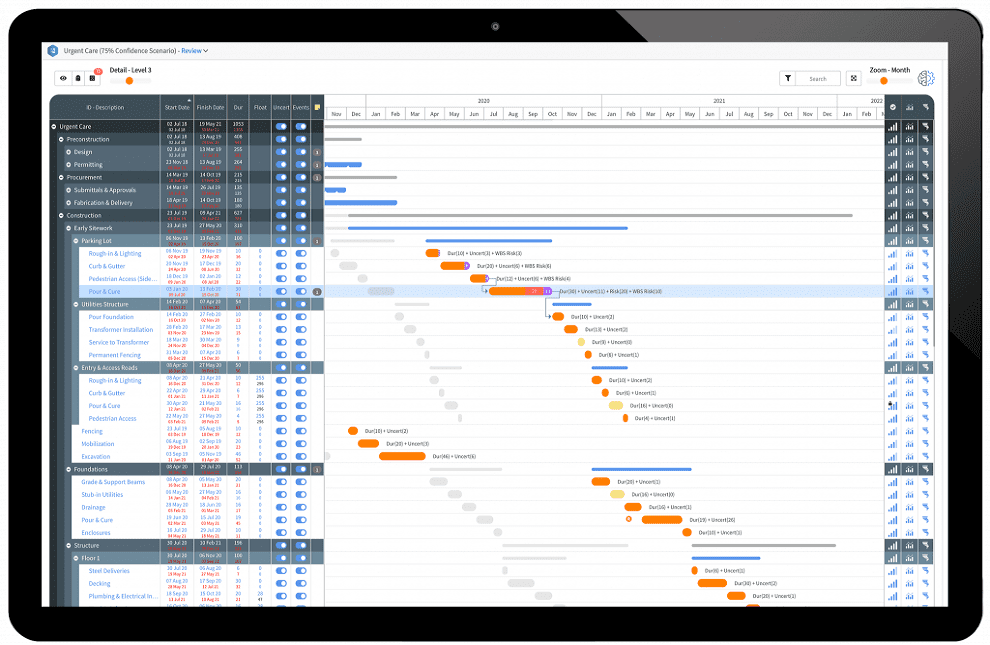
However, the main disadvantage of InEight is that it sells its project planning, scheduling and cost management tools as separate software priced individually, which means you’ll need to purchase multiple products to get all InEight features. That’s not the case with most construction scheduling software in this list. On top of that, it lacks key features such as timesheets, workload charts, status reports or project dashboards.
Verdict: Best Construction Scheduling Software for Document Management
InEight Pros & Key Features
- Change order management features
- Critical path analysis features are good for making sure the project is delivered on schedule
- Good for managing your construction documents
- Cost estimating and forecasting tools
InEight Cons & Limitations
- Non-intuitive user interface feels outdated and makes the software hard to use
- Limited Gantt chart functionality for construction scheduling
- No free trial
- No free plan
InEight Pricing
- Contact sales for a custom quote
InEight Reviews
- G2 review: 4.3 / 5
- Capterra review: 4.4 / 5
Highlighted User Reviews
- “The software works great for large complicated projects.” Chad O – from Capterra
- “One source of truth for a large scale project instead of multiple side lists/sheets/data that need to be compiled together.” Deniel A – from Capterra
- “InEight brings everything the site team needs, it has all kinds of different modules that are suited to all stages of the project.” Abdallah A – from G2
- “Powerful tool for cost estimating projects.” Kyle H – from Capterra
15. BuildBook
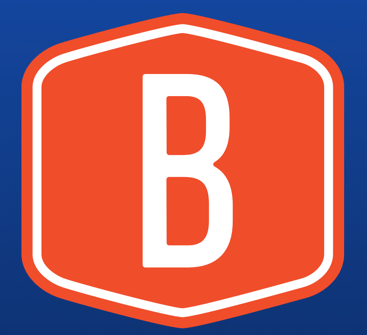
Buildbook is a residential construction scheduling software that offers tools to help contractors and construction firms contact potential clients, prepare proposals and make a schedule for tracking project progress. Some of Buildbook’s key features are cost estimating, invoicing, timesheets and customer relationship management (CRM) tools.
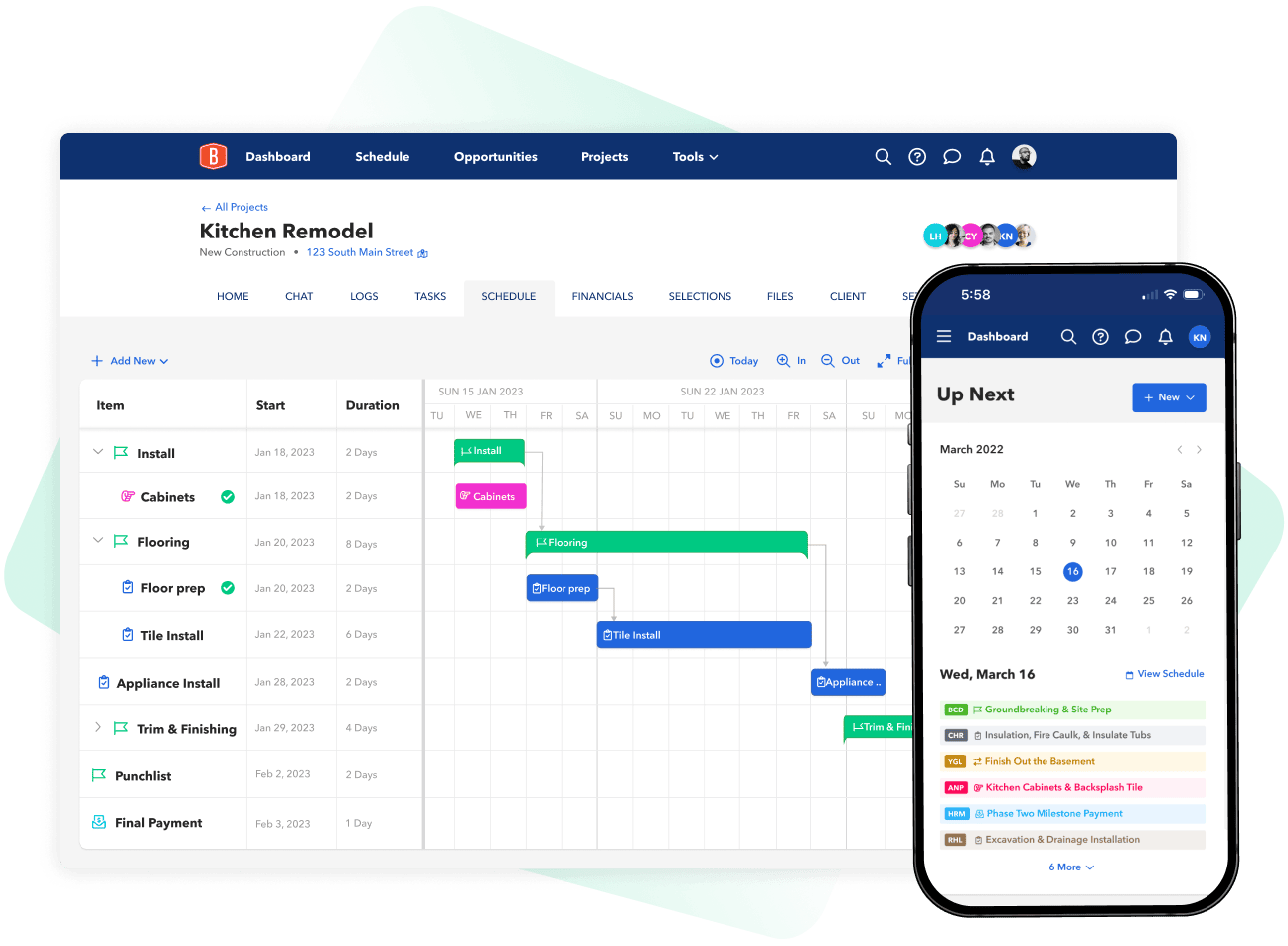
While BuildBook does a decent job at providing various solutions for residential construction contractors, it lacks many scheduling tools such as Gantt charts, kanban boards and task lists—so it can’t be used as a construction timeline software. On top of that, its project scheduling tools are overly basic. For example, you won’t be able to use its project calendar to allocate resources, identify the critical path of a schedule or identify all four types of task dependencies.
Verdict: Best Residential Construction Scheduling Software
BuildBook Pros & Key Features
- Makes it a good contractor scheduling software for residential construction projects
- Offers CRM tools that help contractors communicate with clients and keep them updated
- Cost estimating and project budgeting tools
- Mobile app for Android and iOS
- Free trial
BuildBook Cons & Limitations
- It doesn’t have a Gantt chart like most construction project scheduling tools
- Lack of construction schedule management features other than a project calendar tool and a basic task dependency mapping timeline
- No critical path analysis functionality
- Expensive solution compared to most construction scheduling programs
- No free plan
BuildBook Pricing
- Contact sales for a custom quote
BuildBook Reviews
- G2 review: Not available
- Capterra review: 4.5 / 5
Highlighted User Reviews
- “I do believe they will work the issues and help to create a product that is in tune with the current market needs.” Chris K – from Capterra
- “Overall very positive experience. Very friendly, responsive, and knowledgeable staff.” Tim B – from Capterra
- “The user experience is clean, simple and easy to navigate.” Serena K – from Capterra
- “With Buildbook we have everything we need within reach in the office or on location.” Delaney H – from Capterra
16. Fieldwire

Fieldwire is a construction management software for general contractors, independent contractors and construction firms managing larger residential and commercial projects. With Fieldwire, you can make construction schedules, track the daily progress of job site activities and create punch lists. There are also features to design and store construction documents such as requests for information (RFIs), submittals, specifications and change orders.
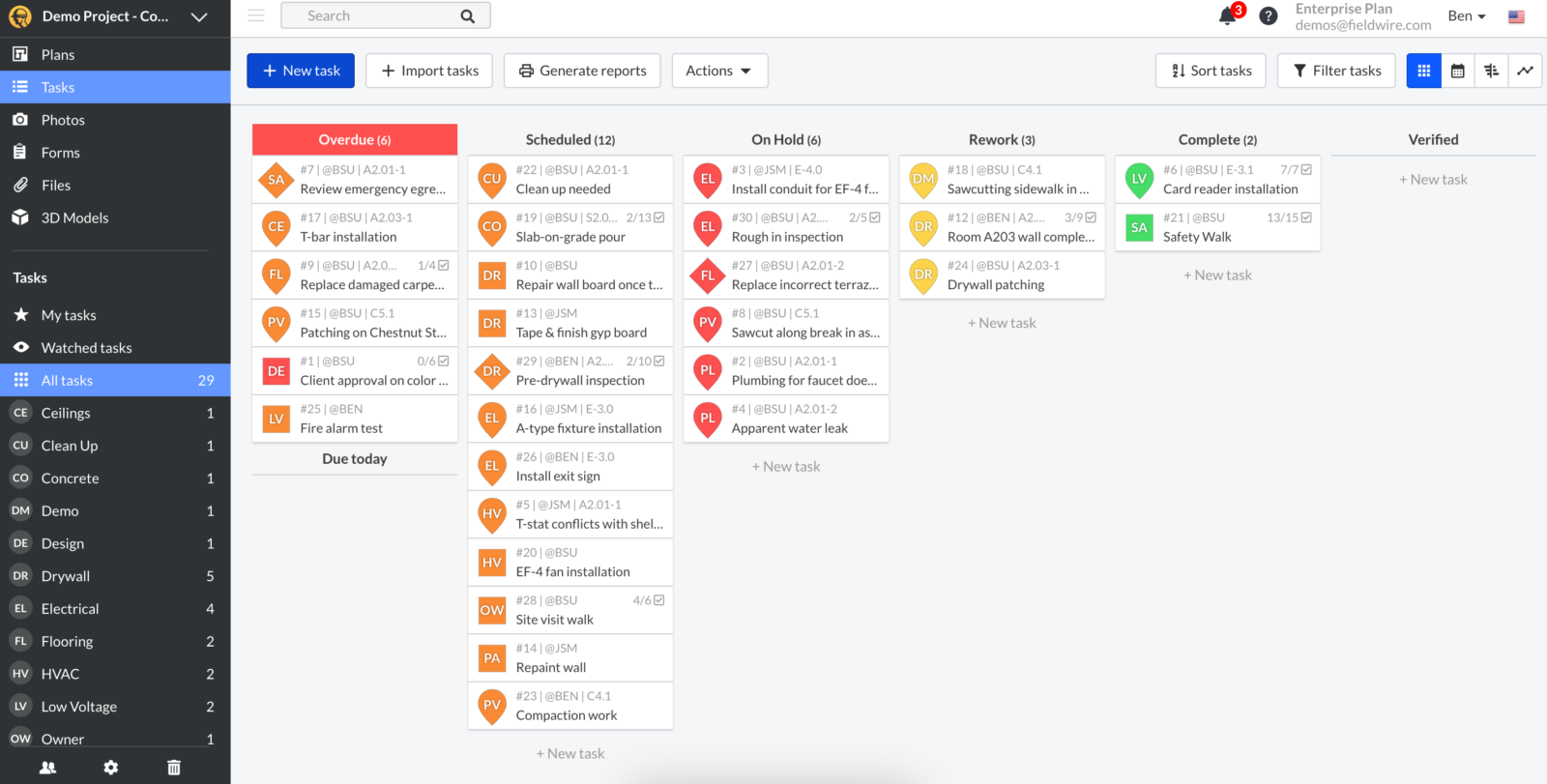
However, Fieldwire falls short when it comes to construction project scheduling due to its lack of features. For example, its Gantt charts don’t have key features such as resource scheduling, critical path analysis or task dependency mapping. Another major drawback is the absence of resource management, cost estimating or project budgeting tools.
While these aren’t necessarily part of construction scheduling, they’re related areas that need to be managed closely. Without them, you may make project schedules that don’t align with resource availability, which can cause serious issues—including project failure.
Verdict: Best Contractor Scheduling Software
Fieldwire Pros & Key Features
- Good for storing and sharing construction documents like proposals, estimates, submittals and change orders
- Construction crews can share photos related to project tasks and site inspections
- Punch lists can be created and tracked using the mobile app at the job site
- Free plan
- Mobile app for Android and iOS
Fieldwire Cons & Limitations
- Gantt charts, kanban boards and project calendars have limited project scheduling functionality
- Lack of cost-tracking tools such as timesheets or dashboards
- Doesn’t have CRM features like other contractor scheduling software
- No free trial
Fieldwire Pricing
- Basic: $0.00 user/month, billed annually
- Pro: $39.00 user/month, billed annually
- Business: $59.00 user/month, billed annually
- Business Plus: $89.00 user/month, billed annually
Fieldwire Reviews
- G2 review: 4.5 / 5
- Capterra review: 4.6 / 5
Highlighted User Reviews
- “Overall I’ve been very satisfied with using Fieldwire as a field report and punch list tool.” Patrick B – from Capterra
- “Information at our fingertips is essential, and Fieldwire readily enables us to access information easily and quickly on the job site, be it from a laptop, iPad, or smart phone.” Corey K – from Capterra
- “Exporting and sharing plans with others is super easy and means you’ll never need a file sharing service to send plans.” Mike P – from G2
- “We are able to keep track of progress, materials and scheduling easily.” Shannen H – from G2
17. Microsoft Project
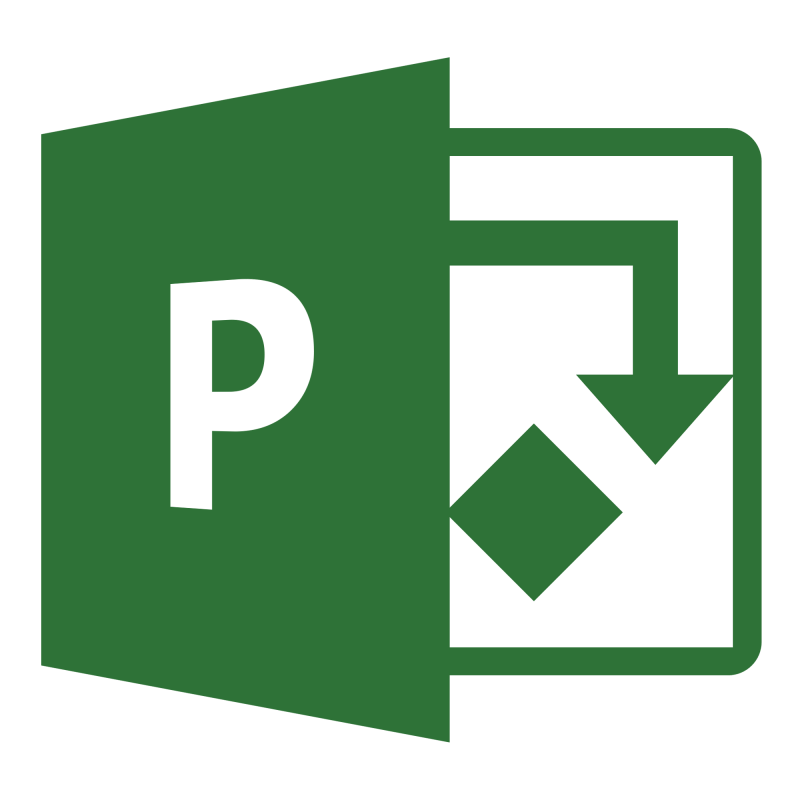
Microsoft Project can be used as construction scheduling software, though it was not specifically designed for the construction industry. It is notable for features such as task scheduling, resource allocation, cost tracking and reporting. For example, it has task dependencies, subtasks and can assign resources to those tasks. It can also analyze the critical path to avoid delays. Where it excels is with kanban boards, which is useful for task management and workflow visualization. Because it’s a Microsoft Project, it seamlessly integrates with other Microsoft tools, such as Office, Power BI and Outlook.
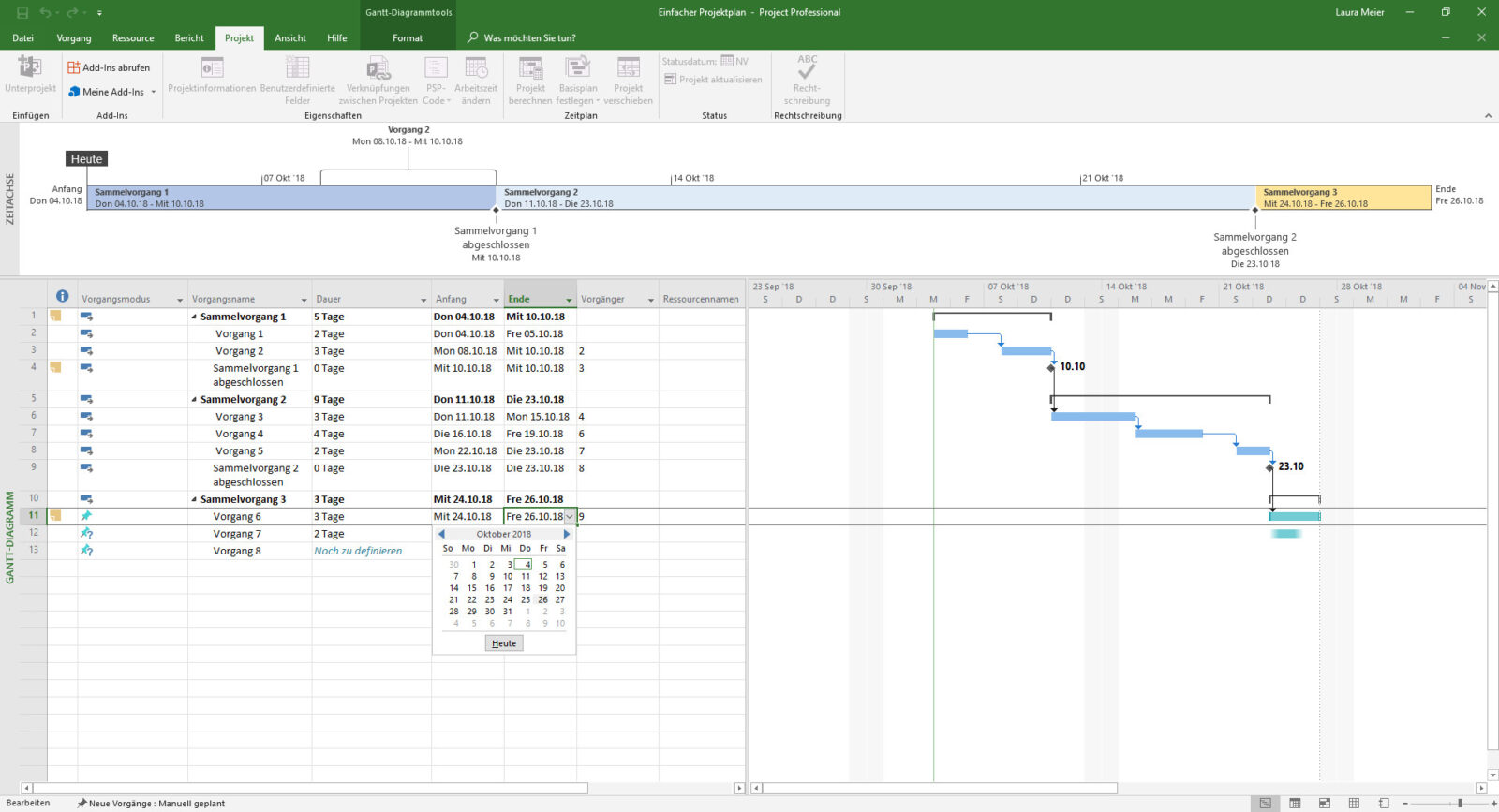
Like others on this list, there is no built-in timesheet, though it can integrate with third-party tools at an extra cost. That is to say, users will have to work at making this tool friendly to construction needs. It doesn’t have advanced features like building information modeling (BIM), detailed material tracking or construction-specific cost management. Like many MS products, there’s a steep learning curve and, when managing larger projects, the interface can become cluttered and difficult to navigate. There’s a mobile app, but with only basic functionality. This is an office-based project management software and its field-level management is limited. The product can get very expensive when adding advanced features.
Verdict: Best Construction Scheduling Software for Kanban Boards
Microsoft Project Key Features & Benefits
- Ideal for those who use other similar Microsoft solutions like Teams, Planner or Lists
- Task management tools, such as kanban boards visualize workflow
- Free plan and free trial
- Mobile app for Android and iOS
Microsoft Project Cons & Limitations
- Has a very limited feature set compared to most construction scheduling software
- Depends on integrations and paid add-ons, which adds to the cost
- There are no built-in timesheets
- Mobile app has only basic functionality
Microsoft Project Pricing
- Project Standard 2024: $679.99, one-time license purchase
- Project Professional 2024: $1,129.99, one-time license purchase
Microsoft Project Reviews
- G2 review: 4/5
- Capterra review: 4.4/5
Highlighted User Reviews
- “It’s a powerful tool for managing complex projects, offering detailed features like task scheduling, resource allocation, and progress tracking.” Mazhar A – from Capterra
- “The quality of MS Project output is often sufficient for the requirement of most projects.” Paul B – from Capterra
- “I love the automatically generated gantt charts and the timeline feature.” Eric B – from G2
- “It is easy to set up a project plan using templates provided in MS Project.” Alex N – from G2
18. Primavera P6

Primavera P6 is construction scheduling software developed by Oracle. It’s made to be used when managing large-scale construction projects with scheduling capabilities that allow for complex and detailed project timelines. It has multiple project views, including Gantt charts, resource histograms and network diagrams. There’s also resource planning and management to track labor, materials and equipment allocation.
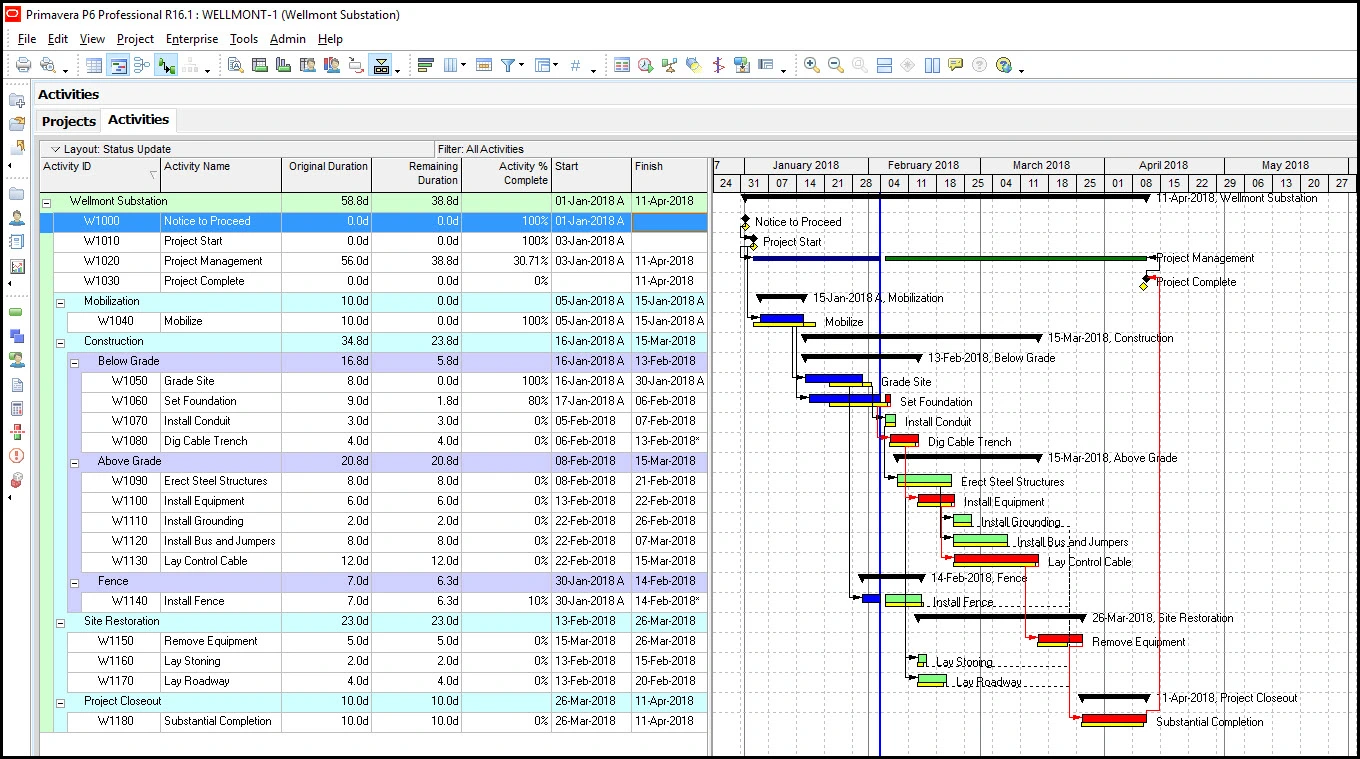
However, the software doesn’t have built-in timesheet functionality as part of its core features. It is mainly focused on scheduling, resource management and cost control. But those tools are complex and require a steep learning curve to command, which means training and resources allocated to navigating and setting up projects. To add insult to injury, this tool is expensive. Small-to-medium sized companies will likely not have the budget to use it. For those that make the investment, the software is resource intensive and can be slow, especially with larger projects or handling complex data.
Verdict: Best Construction Scheduling Software for Complex Projects
Primavera Key Features & Benefits
- Robust scheduling features
- Multiple project views
- Mobile app for Android and iOS
- Free trial
Primavera Cons & Limitations
- Steep learning curve
- Expensive and resource intensive
- No built-in timesheets
- Can run slow for larger, complex projects
- No free plan
Primavera Pricing
The pricing for Primavera products in this blog comes from the Oracle Primavera Global Price List.
- Primavera P6 Enterprise Project Portfolio Management: $2,750.00 license price, plus an additional $605.00 fee for software update license & support
- Primavera P6 Progress Reporter: $950.00 license price, plus an additional $209.00 fee for software update license & support
- Primavera P6 Professional Project Management: approx. $2,500.00 license price, plus an additional $550.00 fee for software update license & support
Primavera Reviews
- G2 review: 4.4/5
- Capterra review: 4.4/5
Highlighted User Reviews
- “The schedule is very easy to observe. Easy to operate. I use it frequently.” Srinidhi S – from G2
- “I call it the best Project control and scheduling app for construction projects.” Amirshahab S – from Capterra
- “Comprehensive set of tools for managing projects, from planning and scheduling to execution and monitoring.” Muzammil H – from G2
- “Oracle PrimaveraCloud provides a comprehensive project management solution for projects of any size and complexity.” Coraly C – from Capterra
19. Microsoft Planner
Microsoft Planner is a construction scheduling software designed for teams who want a visual way to manage construction projects. It offers boards, buckets and cards that let users organize tasks and track progress across multiple construction phases. With drag-and-drop functionality and integration with Microsoft 365 apps like Teams and Outlook, Planner helps keep schedules aligned and communication clear. Its cloud-based interface allows teams to collaborate in real time and receive updates instantly as project timelines shift.
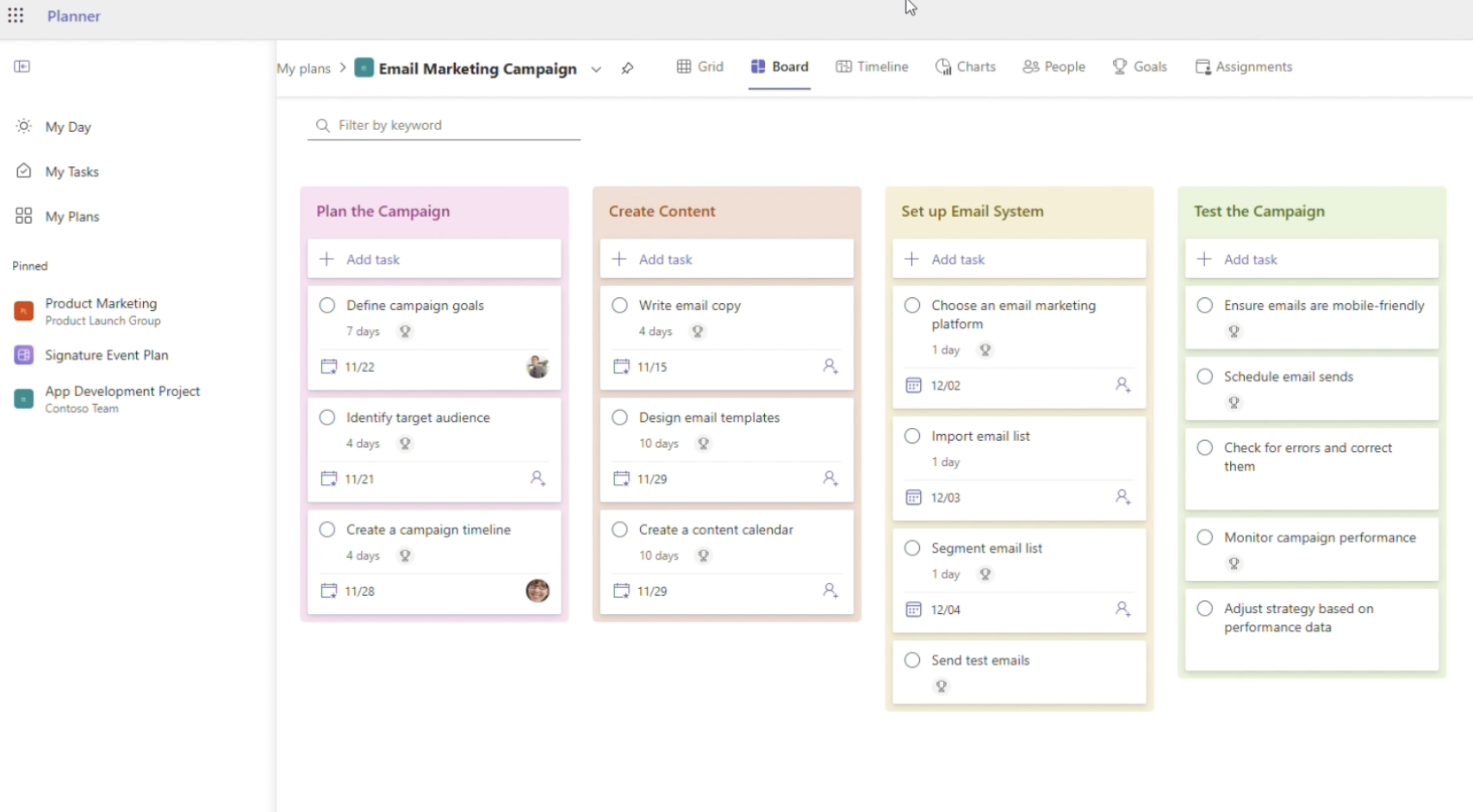
While Microsoft Planner is simple to use and effective for basic construction scheduling, it lacks some advanced project management tools. It does not include detailed Gantt charts, resource allocation tracking or time tracking features that construction managers may need for complex projects. However, its seamless integration with other Microsoft tools makes it a convenient choice for teams already using the Microsoft ecosystem. Planner is ideal for small to medium construction projects that require lightweight scheduling without extensive customization.
Verdict: Best Online Construction Scheduling Software for Task Management
Microsoft Planner Pros & Key Features
- Visual task boards for construction project management
- Integration with Microsoft 365 apps for scheduling and collaboration
- Cloud-based platform with real-time updates and notifications
- Mobile app support for Android and iOS
- Simple and intuitive interface for quick setup
Microsoft Planner Cons & Limitations
- No built-in Gantt charts for construction planning
- Limited resource management and time tracking tools
- Lacks advanced project management customization
- No invoicing or bidding features for construction projects
- No free standalone plan outside Microsoft 365 subscription
Microsoft Planner Pricing
Before diving into the pricing plans available for Microsoft Planner, it’s important to understand there are two main versions of this software, Microsoft Planner Basic and Microsoft Planner Premium.
Microsoft Planner Basic Pricing Plans
The version included in most Microsoft 365 subscriptions. Good for lightweight task management. Starts from $6 to $22 per user per month, billed annually. Price varies depending on the Microsoft 365 subscription.
- Microsoft 365 Business Basic: $6.00/user/month, billed annually
- Microsoft 365 Business Standard: $12.50/user/month, billed annually
- Microsoft 365 Business Premium: $22.00/user/month, billed annually
- Microsoft 365 Apps for Business: $8.25/user/month, billed annually
Microsoft Planner Premium Pricing Plans
The next level up, for users or teams needing more advanced project management features.
- Planner Plan 1: $10.00/user/month, billed annually
- Planner and Project Plan 3: $30.00/user/month, billed annually
- Planner and Project Plan 5: $55.00/user/month, billed annually
For more detailed information about each of these Microsoft Planner plans and the features that are available for each pricing tier, visit our Microsoft Planner blog.
Microsoft Planner Reviews
- G2 review: 4.2/5
- Capterra review: 4.3/5
Highlighted User Reviews
- “Overall, my experience with Microsoft Planner has been very positive, as it has helped my team share tasks and establish procedures to follow.” Alvaro G – from G2
- ”User Interface and its simplicity to manage tasks and allocate to agents.” Hitesh A. – from G2
- “Microsoft Planner is great because it’s part of the Microsoft 365 family. It works really well with other Microsoft apps like Teams and Outlook, making it easy to use.” Anand G – from Capterra
- ”Easy to use and setup. I can easily assign tasks, and it’s very cost effective. Does everything that I need for my planning.” Haley B. – from Capterra
20. Wrike
Wrike is a cloud-based construction scheduling software tailored for teams seeking comprehensive project management capabilities. It offers interactive Gantt charts, customizable workflows, and real-time collaboration tools, enabling construction teams to plan, execute, and monitor projects efficiently. With features like workload charts and resource management, Wrike provides visibility into team capacity and task dependencies, ensuring projects stay on track and within budget. Its scalability and integration with over 400 apps make it suitable for both small teams and large enterprises.

Wrike is popular with the general public, but can be a poor choice for construction scheduling due to its steep learning curve, complex interface, limited mobile functionality and lack of construction-specific features like built-in Gantt charts that auto-update or formal leave management systems. It also comes with a high cost, especially when considering advanced features as add-ons, and its user management can be restrictive for organizations with complex hierarchies.
Verdict: Best Online Construction Scheduling Software for Real-Time Collaboration
Wrike Pros & Key Features
- Interactive Gantt charts for visual project planning
- Customizable workflows and request forms
- Real-time collaboration and communication tools
- Time tracking features for logging contractor hours
- Workload charts for resource management and capacity planning
- Automation capabilities to reduce manual tasks
- Integration with over 400 apps for enhanced functionality
- Scalable platform suitable for teams of all sizes
Wrike Cons & Limitations
- Advanced features may require a learning curve for new users
- Pricing may be higher compared to some competitors
- Some users report occasional performance issues with large datasets
- Customization options may be limited in lower-tier plans
Wrike Pricing
- Free: $0 user/month
- Team: $10.00 user/month
- Business: $25.00 user/month
- Enterprise: contact sales for a custom quote
- Pinnacle: contact sales for a custom quote
Wrike Reviews
- G2 review: 4.2/5
- Capterra review: 4.4/5
Highlighted User Reviews
- “Wrike has become essential in my day and keeps me organized and on top of my tasks.” Paige T – from G2
- ”Wrike is a user-friendly tool, for the end-users it is easy-to-use with a simple user interface, users need relatively little time to start using the tool. The tool is also easy to set up.” Sabrina C. – from G2
- “Productivity has been enhanced by removing essential but repetitive chores.” Denise S – from G2
- ”It has improved the overall completion of our time critical tasks, works well with collaboration and has no reliability issues.” Christian S. – from Capterra
What Are the Main Benefits of Using Construction Scheduling Software?
You can use analog methods, tools and techniques like PERT charts or network diagrams to make a construction project schedule, but there are many reasons why using scheduling software for construction is a much better choice.
Facilitates Project Schedule Management
Online Gantt charts, project calendars and kanban boards can greatly facilitate schedule management tasks such as estimating the total duration of projects and identifying critical path activities and task dependencies. These can double as tracking features, which can monitor the status of your construction project schedule in real time.
More Accurate Time Tracking and Labor Costs Estimates
Construction scheduling software features such as timesheets and workload management charts allow you to assign tasks to team members and monitor work hours, so you can balance workload, track labor costs and process payroll.
Track Construction Site Activities and Collaborate Online
Online construction software and mobile apps simplify communication and record-keeping. Collaborate in real time, send photos and share files on one platform. This is the ideal way to connect job sites with the construction project management office.
FAQs
Choosing software for scheduling your construction projects is an important decision, which is why we’ve gathered some of the most frequently asked questions about construction scheduling software and related topics.
What Is the Best Construction Scheduling Software?
ProjectManager is the best construction scheduling software due to its advanced project management tools and features. Additionally, ProjectManager is an online platform with top-notch team collaboration features such as unlimited file storage, instant messaging and real-time project tracking to help connect teams in the construction site.
Is There Any Free Construction Scheduling Software?
Yes. While most of the best scheduling software for construction in this list is paid, you can still find some free alternatives. For example, you might find construction scheduling programs with free plans at the expense of limited functionality, or you can also use the free trial period to evaluate various solutions for free.
What Are the Types of Construction Scheduling Software?
As stated above, there are many construction scheduling tools with unique features and functionality, which are determined by their target audience. The most popular types of construction software are contractor scheduling, job scheduling, commercial and residential.
What Is Contractor Scheduling Software?
Contractor scheduling software offers features that are specifically tailored to help contractors manage their operations. For example, it can help them communicate with their clients, manage construction documentation, generate invoices, estimate project costs, log daily activity at the job site and more.
What Is Commercial Construction Scheduling Software?
Commercial projects are large, complex and expensive. Ideally, commercial construction scheduling software should offer project planning, resource scheduling, and cost-tracking features.
Because of their scale, commercial projects require a lot of resources which means the schedule must be accurate or else the project cost will increase dramatically. If there’s a discrepancy between your project schedule and the actual project completion timeline, you’ll need to assume many additional, unexpected construction costs. If you’re managing a commercial construction project, you’re going to want the most advanced scheduling and tracking features available to keep on time and budget.
What Is Residential Construction Scheduling Software?
Residential construction refers to any construction project that makes buildings for people to live in, such as building a brand new home, remodeling one or even making an apartment building of up to four floors, according to the U.S. Department of Labor.
Residential projects have unique challenges that other projects don’t. For example, the project owner is the person who’ll be residing in the building, which makes them pay special attention to detail and have specific requirements, so you’ll need to constantly communicate with the project owner and keep him updated on progress.
Change requests are also common in residential projects, as owners can typically change their minds about aspects of the project, which may require additional planning, estimating and budgeting from the construction project manager. Residential construction scheduling software will have change management features to address these scenarios.
Related Content
- Best Construction Software for Mac
- Best Construction Management Software for a Small Business
- Best Construction Software for Mac”
- Best Construction Estimating Software
- Making a Construction Schedule: Construction Scheduling Basics
- 24 Construction Documents (Templates Included)
- The 5 Construction Phases (Templates Included)
- 10 Mejores Software de Programación de Construcción
- 10 Meilleurs logiciels de planification de la construction en 2025
Construction project management is a big field that requires robust and dynamic project management software to handle all its moving parts. ProjectManager is construction project management software that has the tools to plan, monitor and report on every phase of the project’s life cycle. It’s uniquely equipped for construction, with visual workflow features like its kanban boards and online Gantt charts that schedule and help teams collaborate. See for yourself by taking this free 30-day trial.

